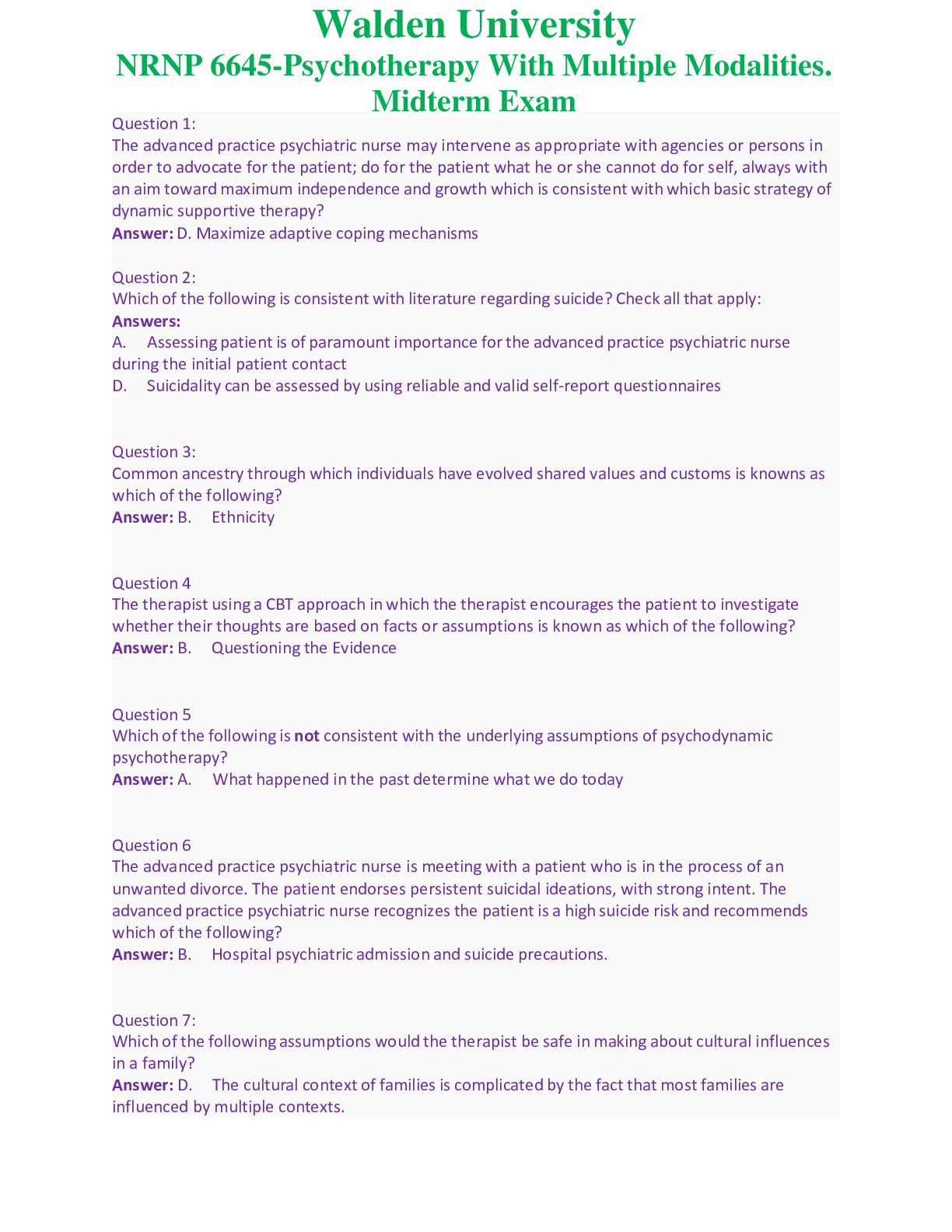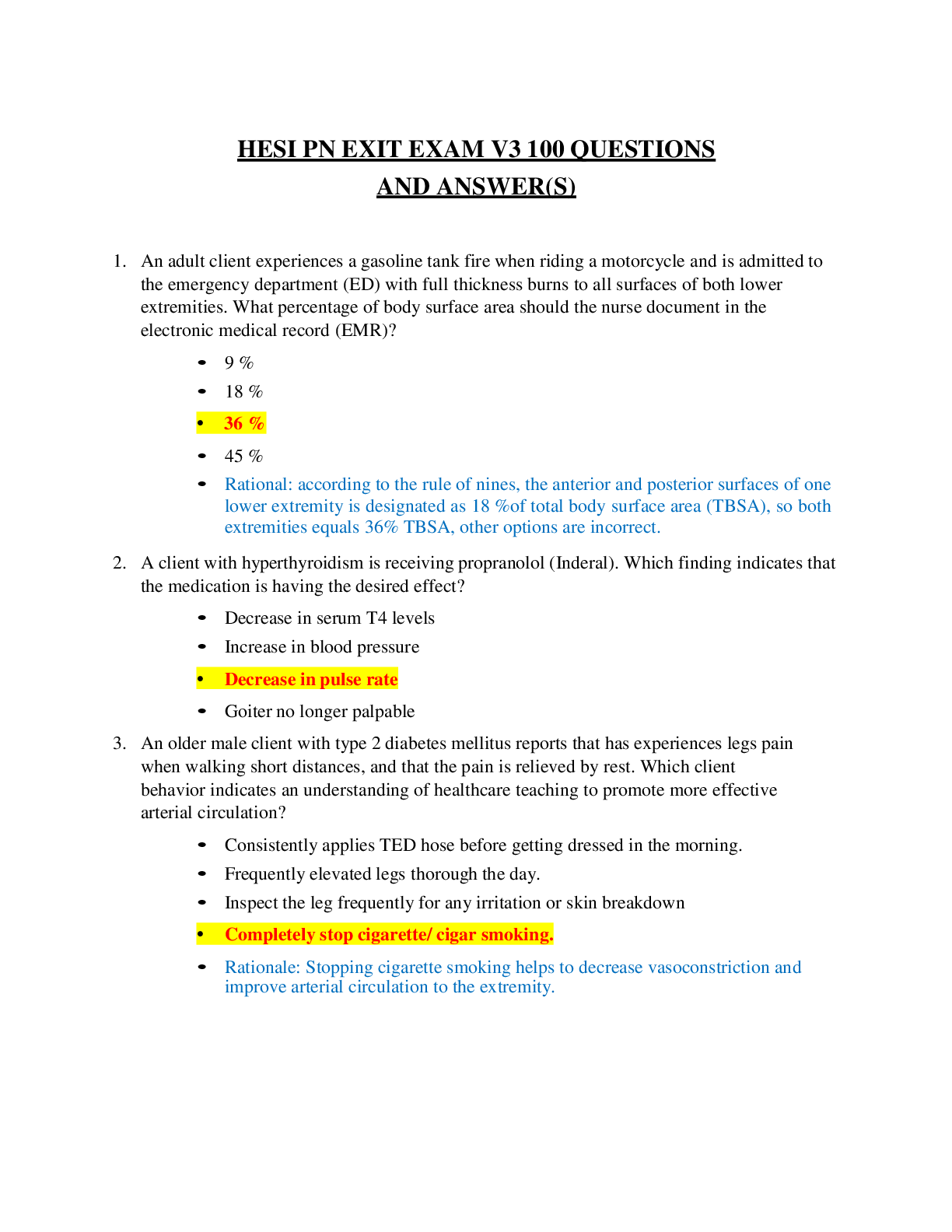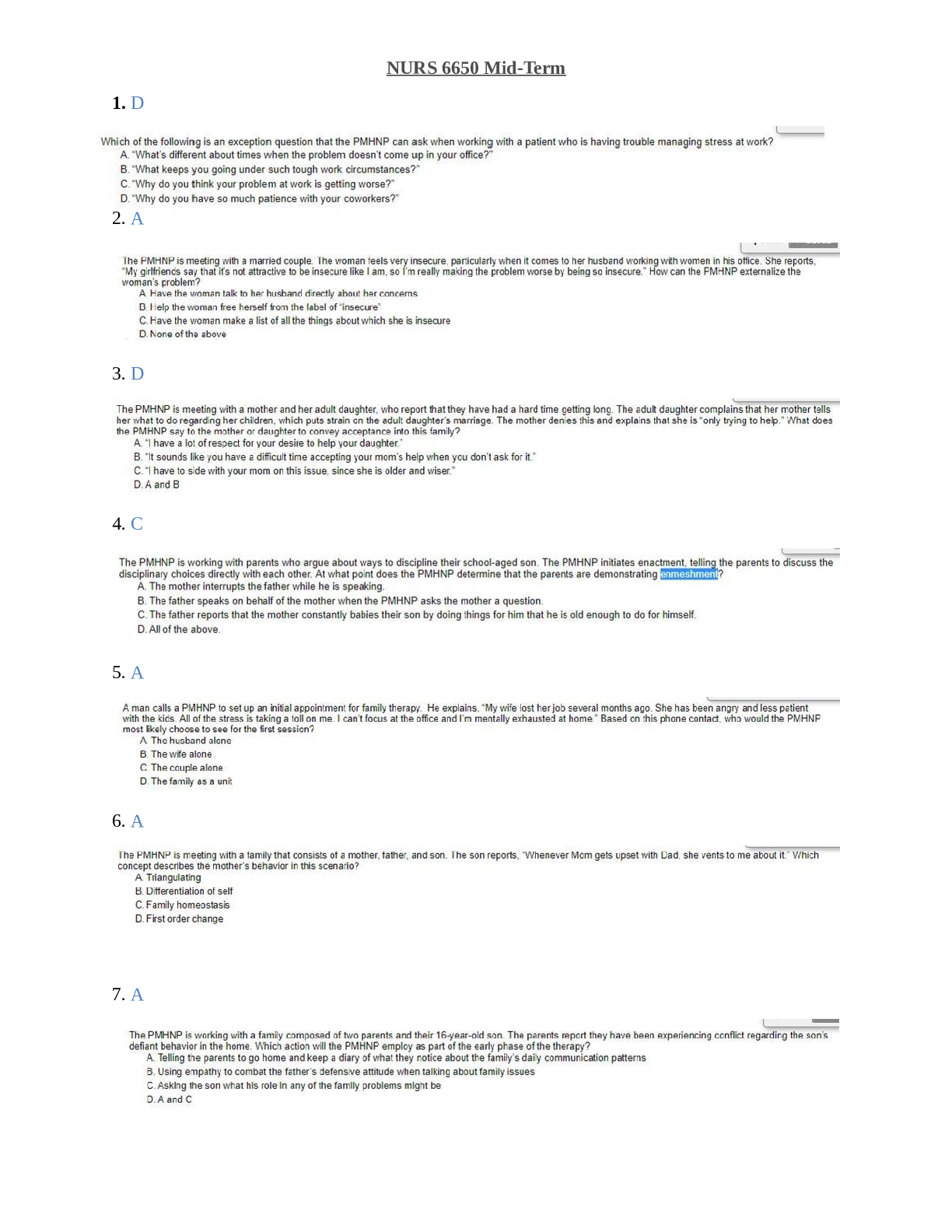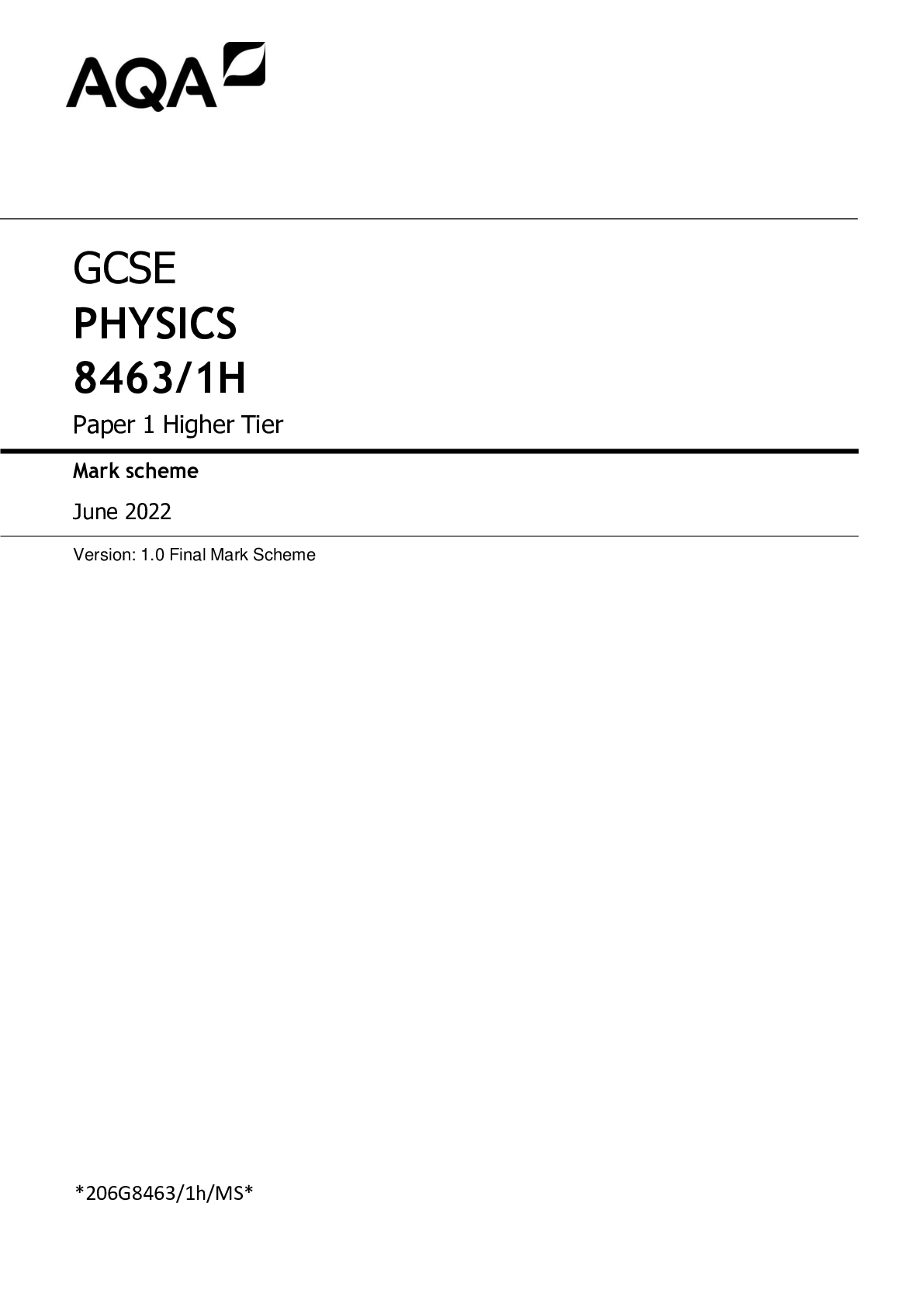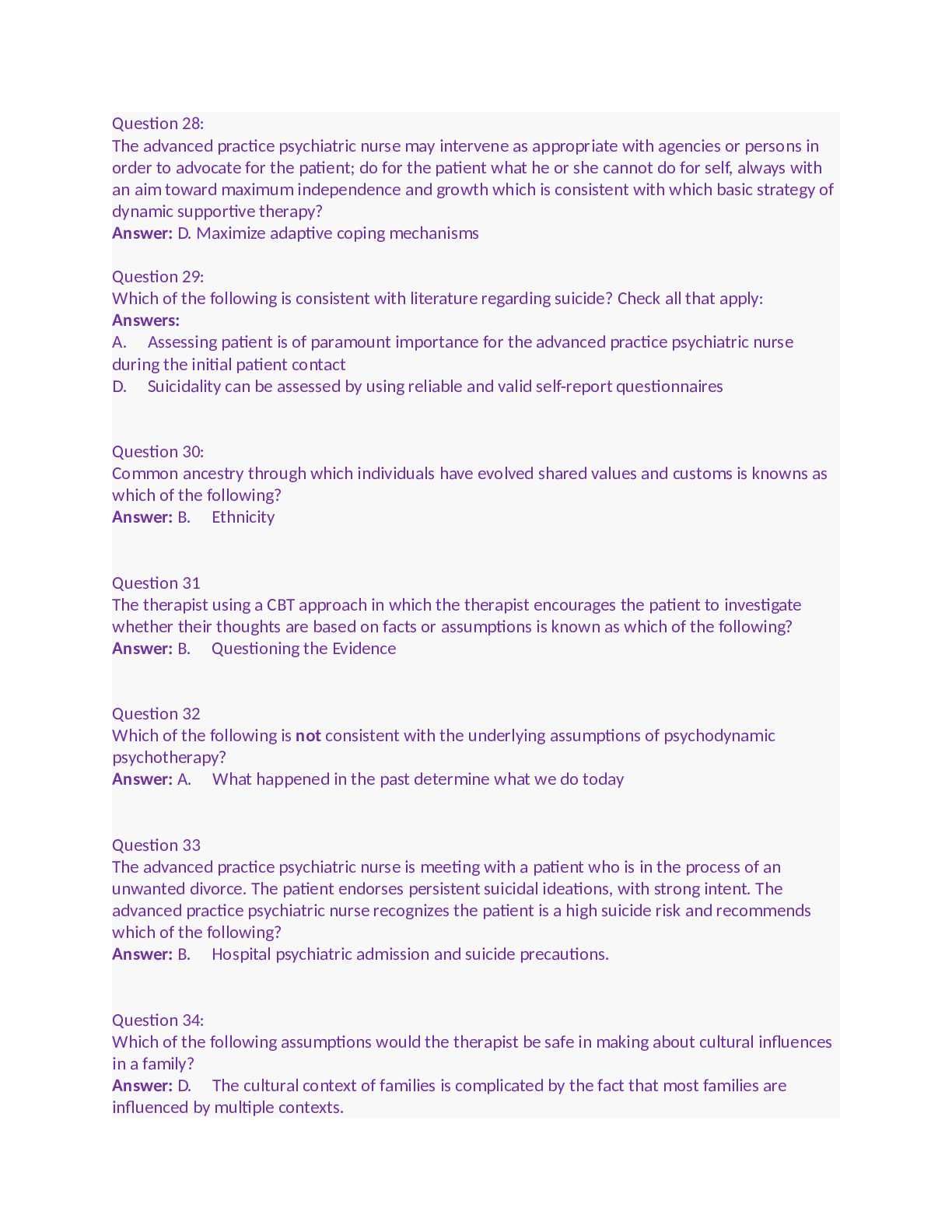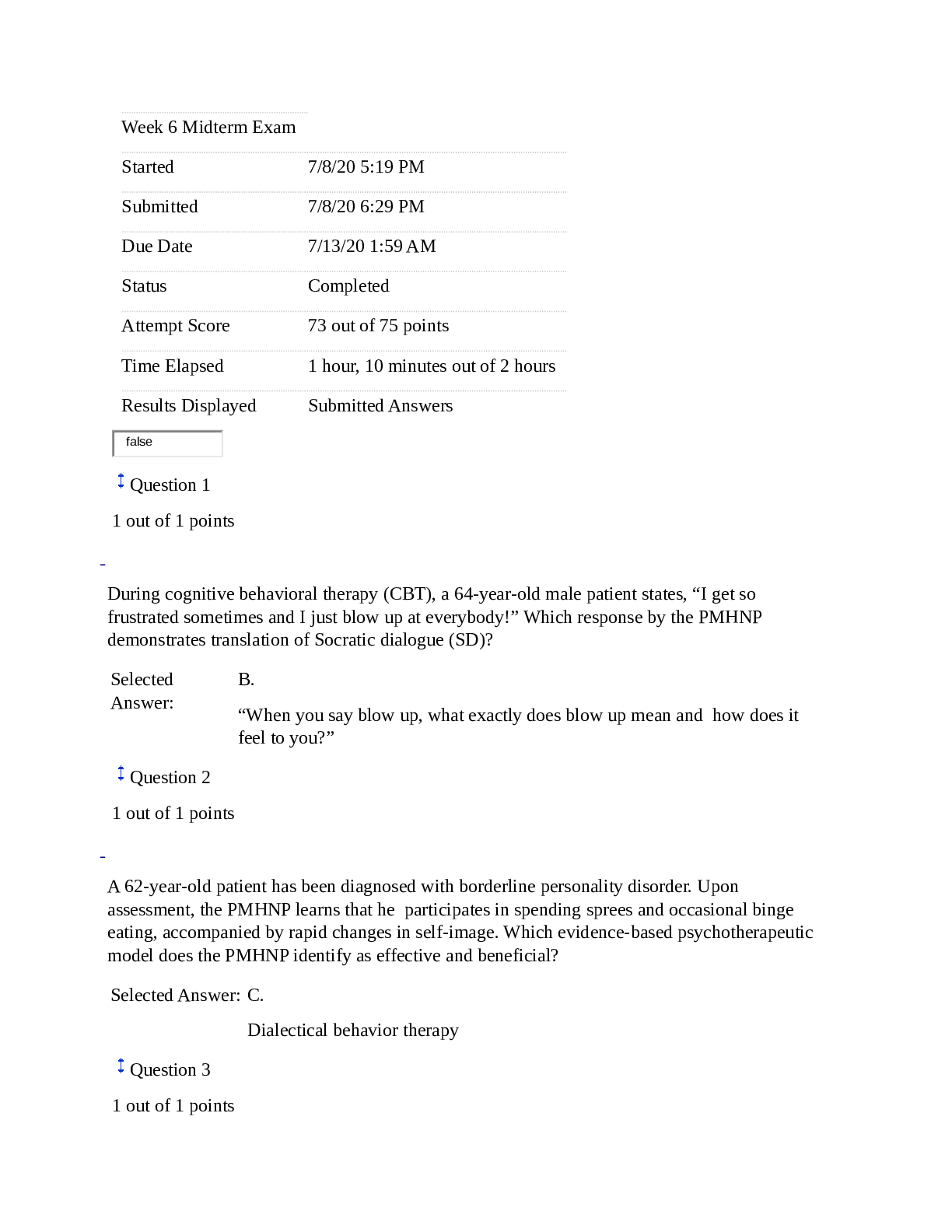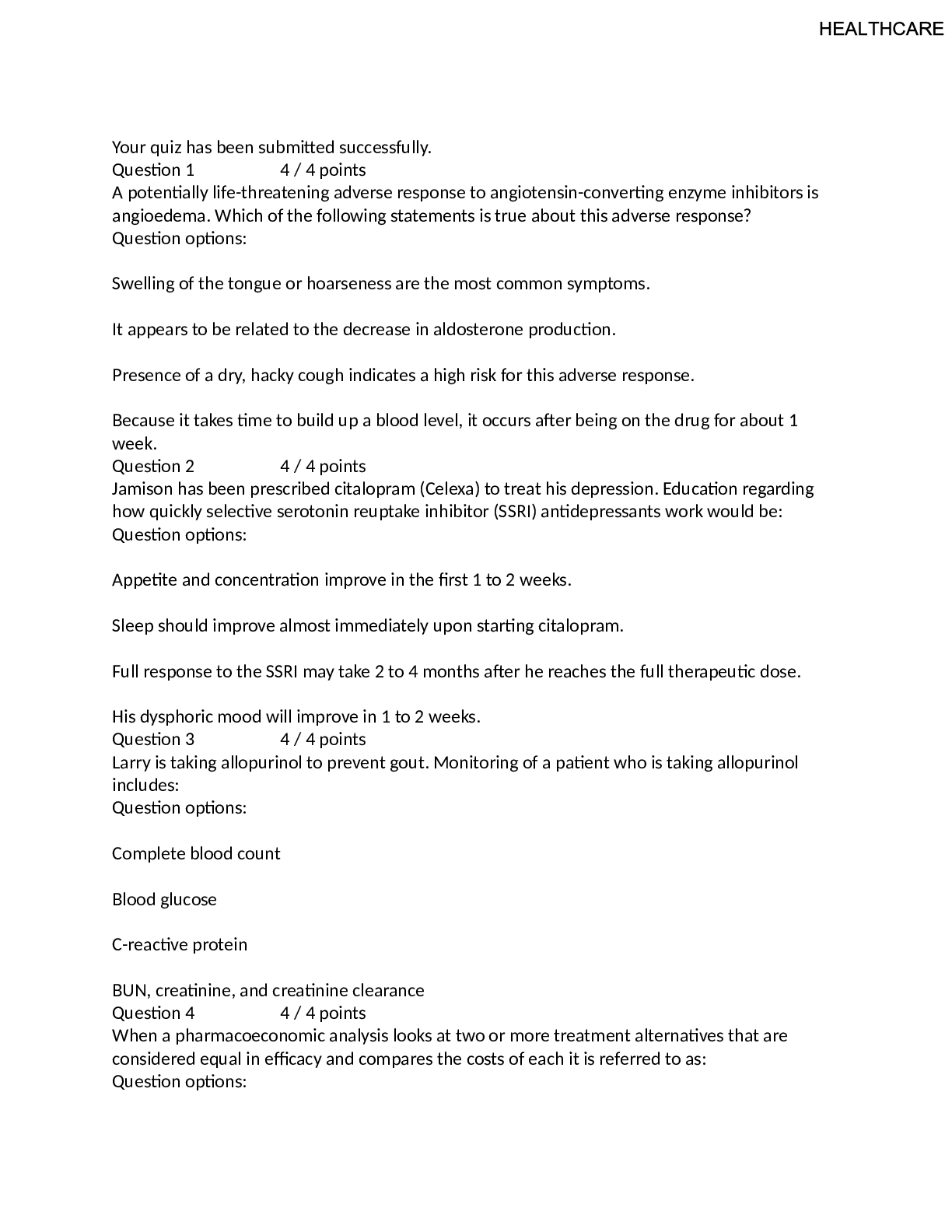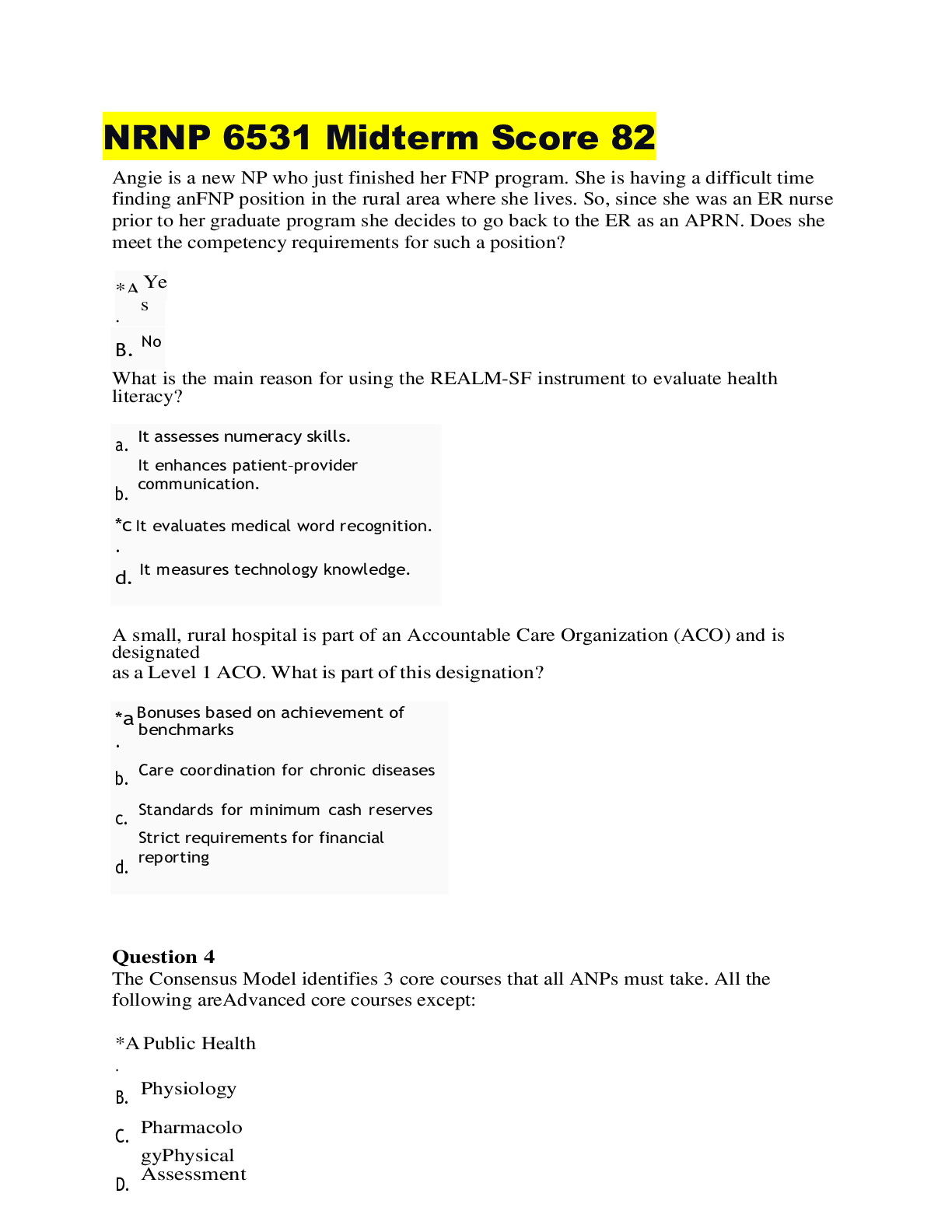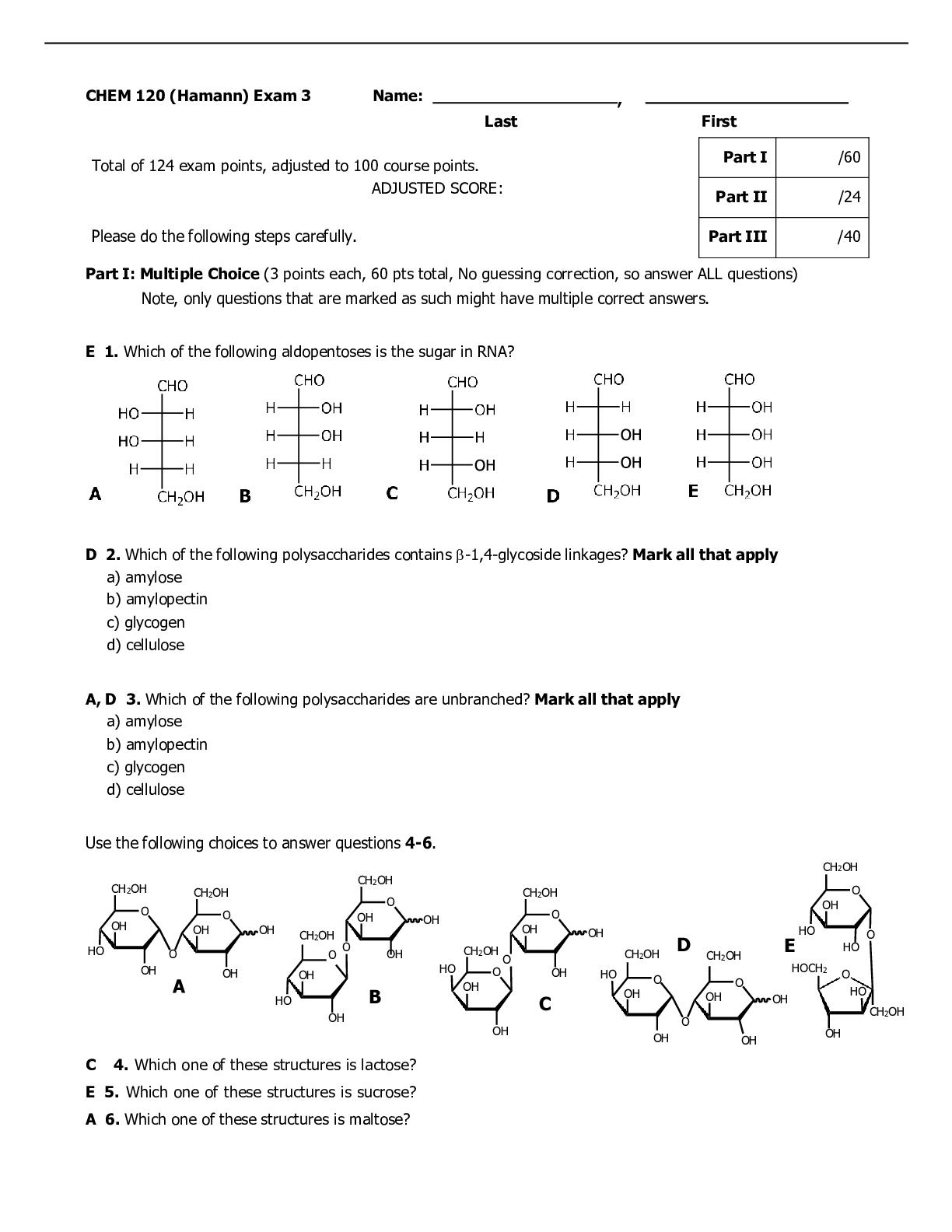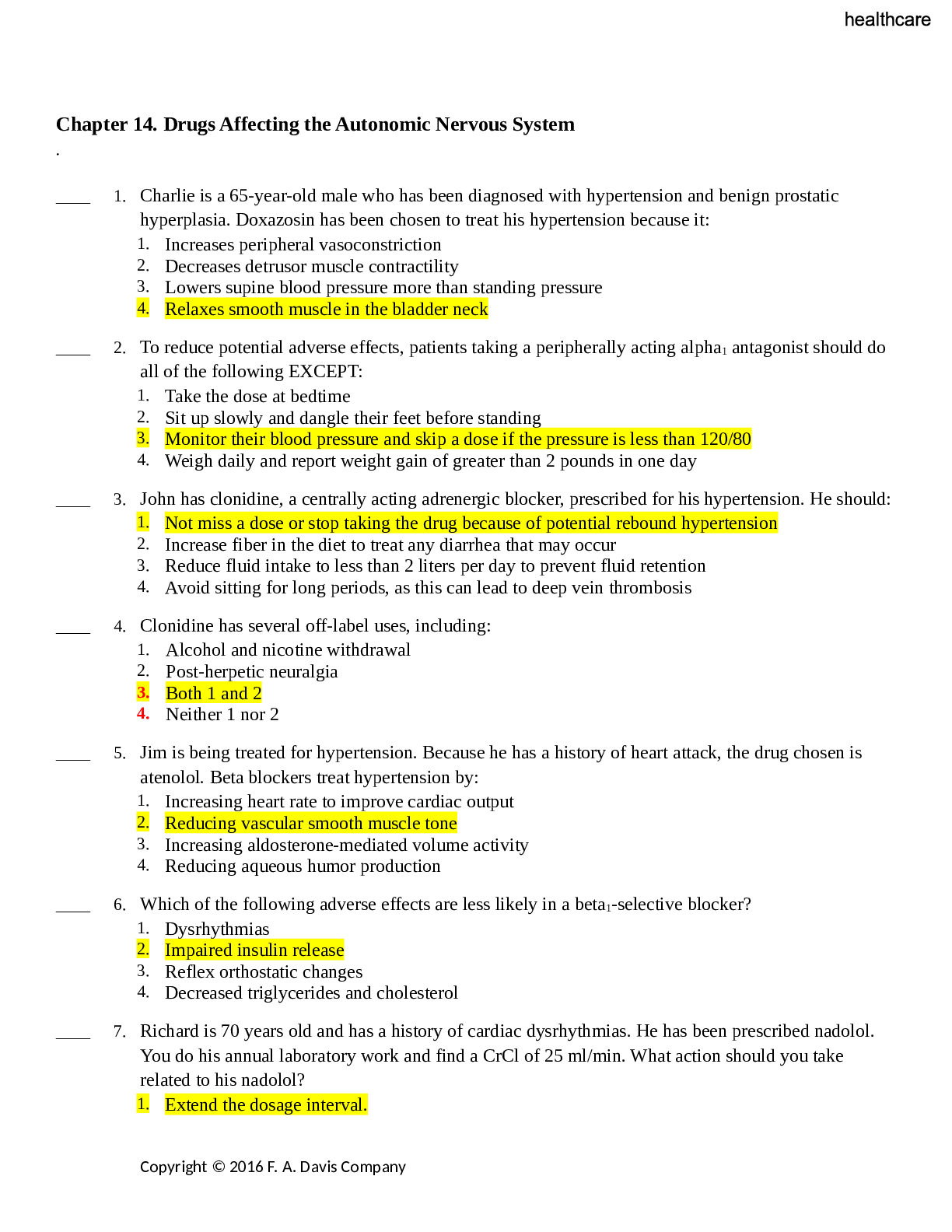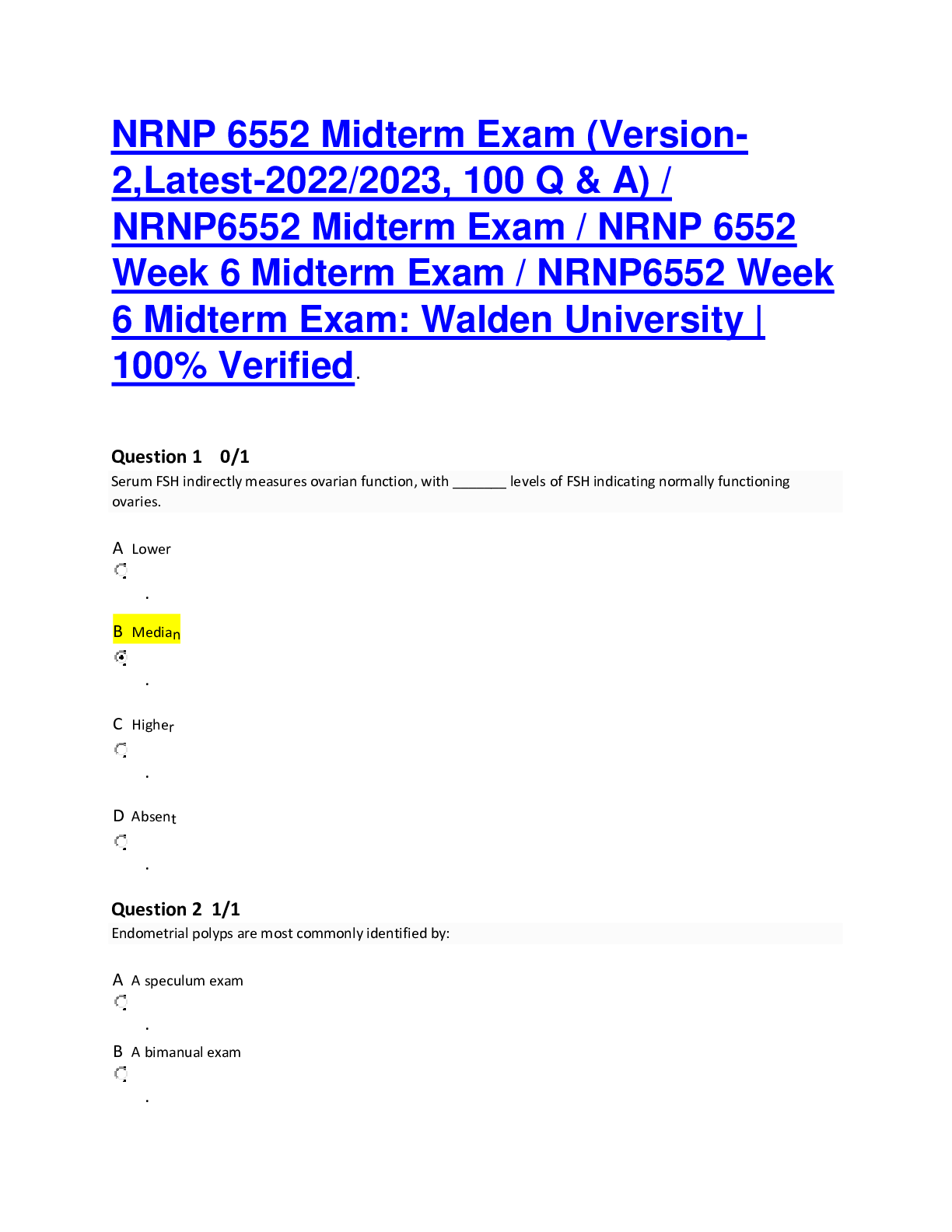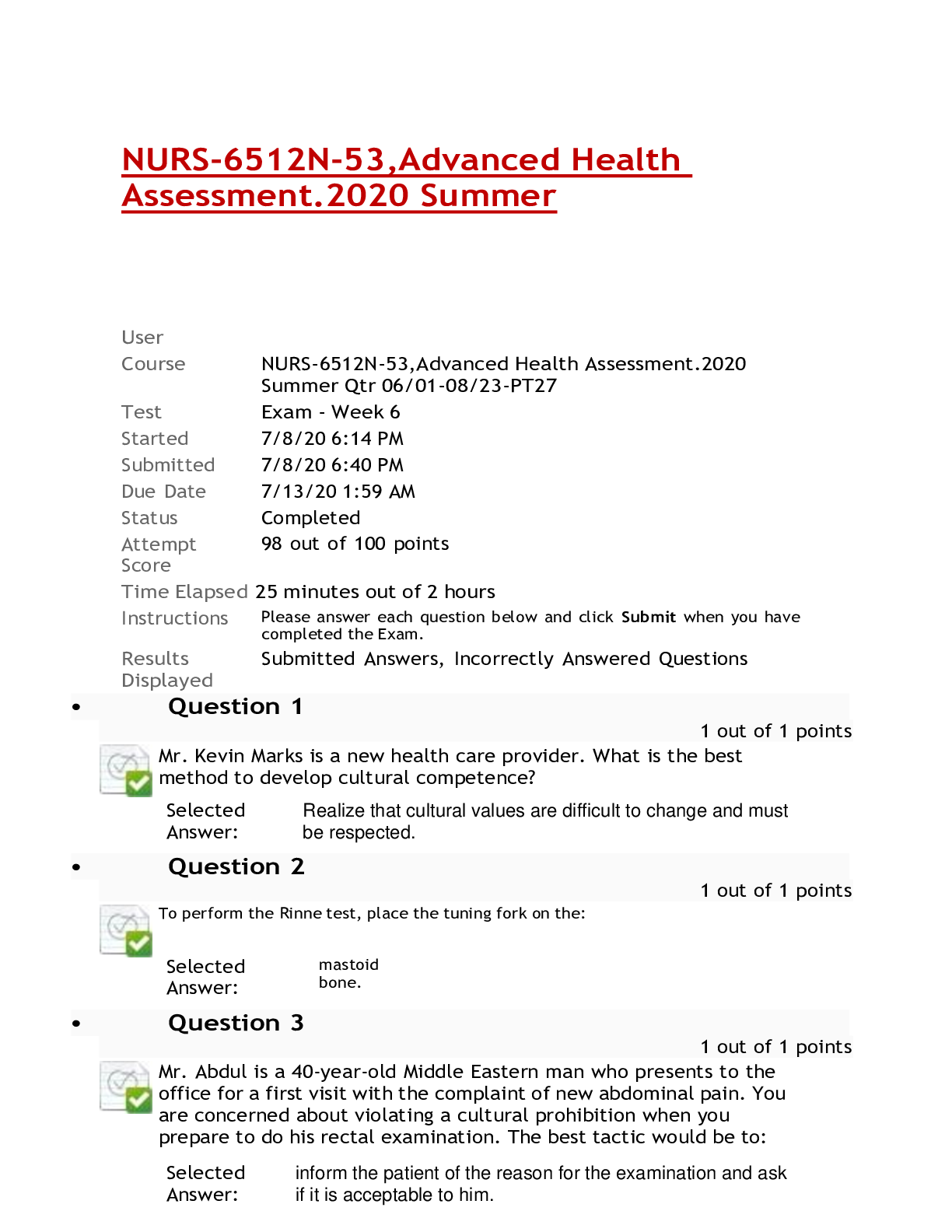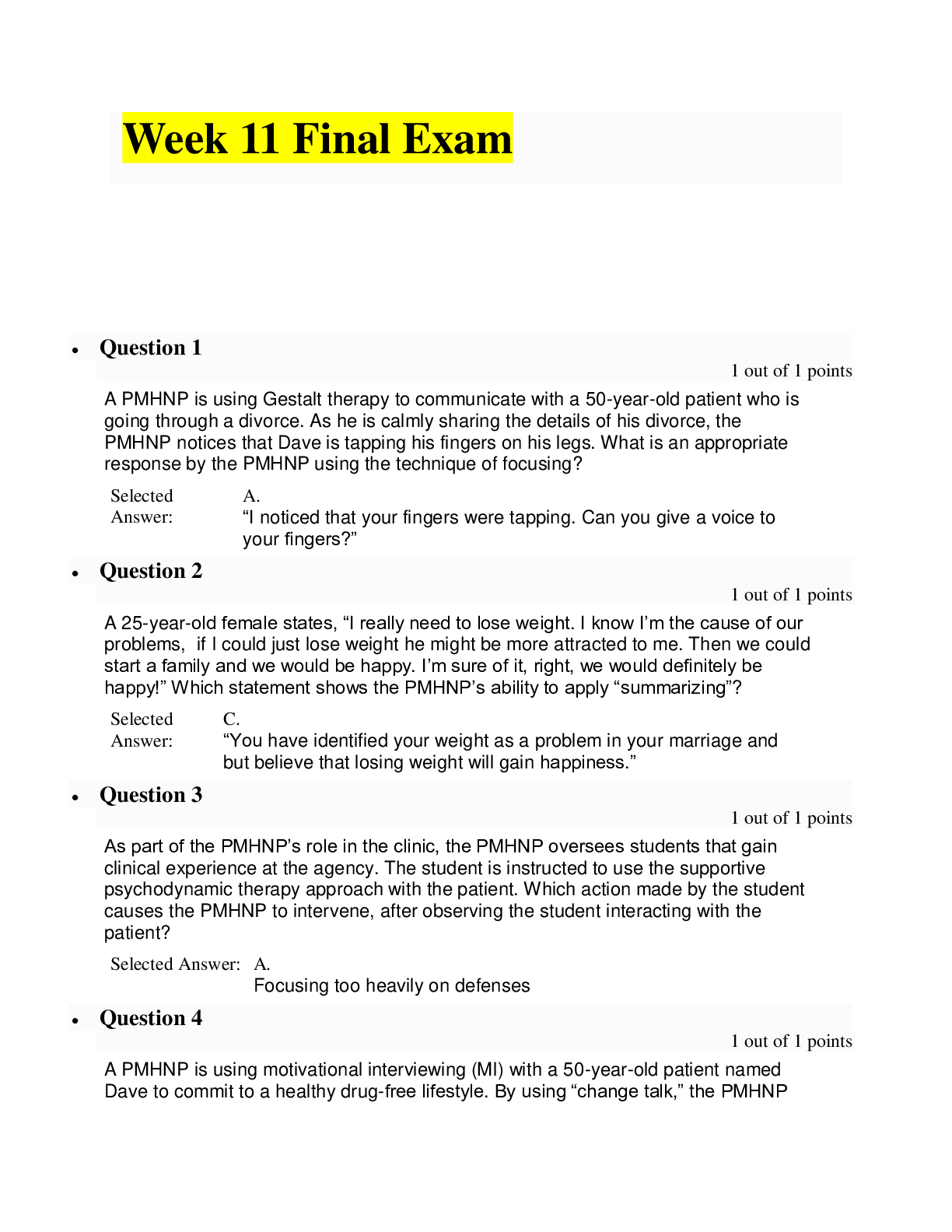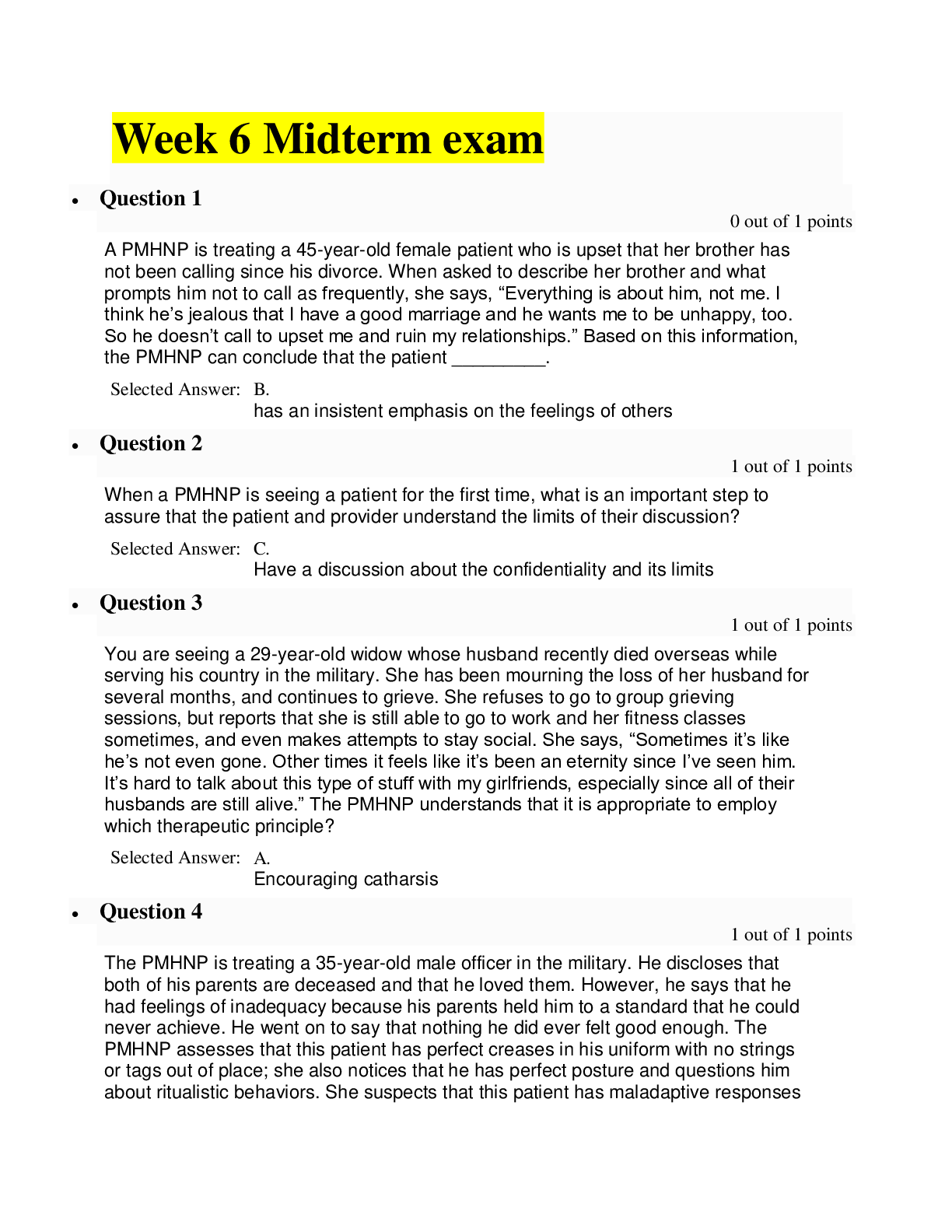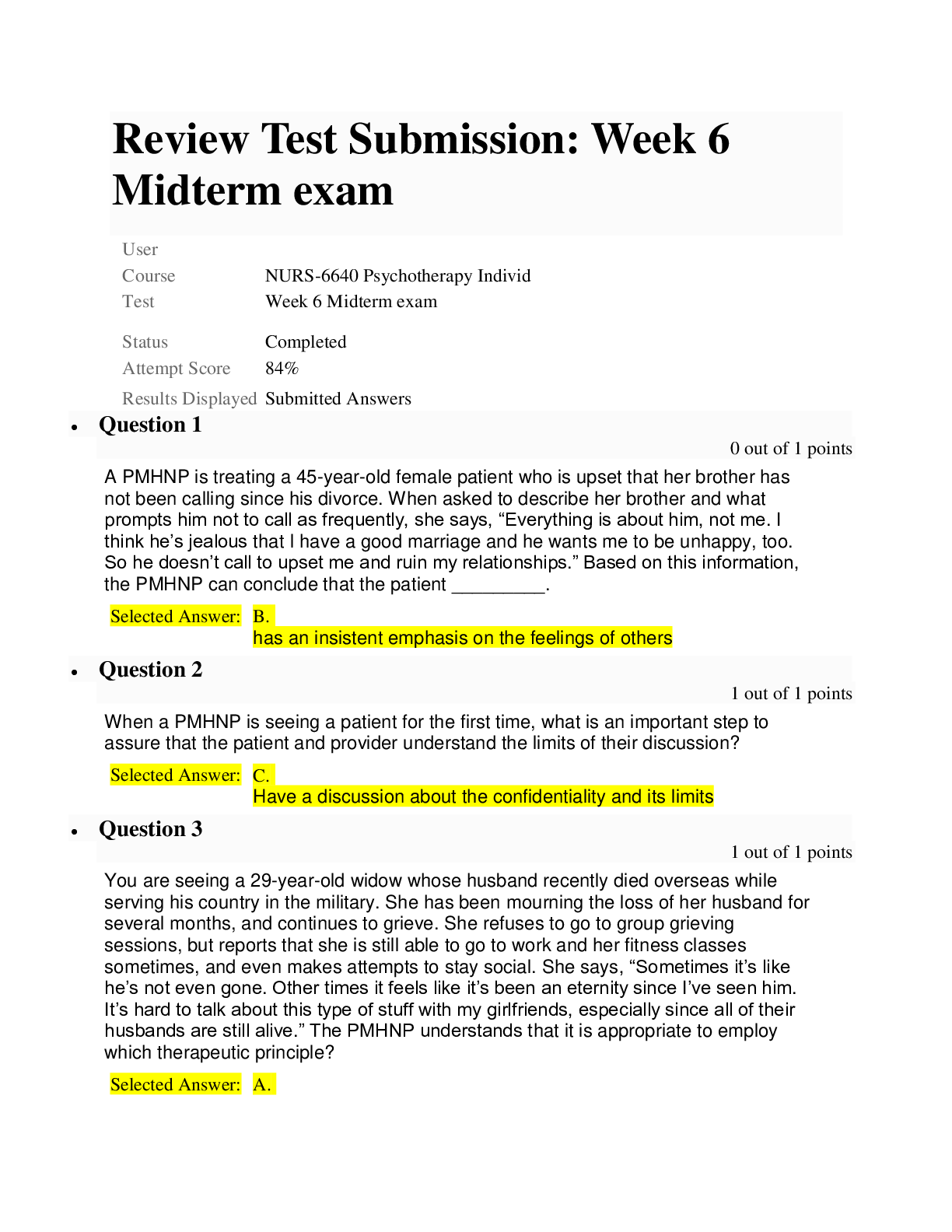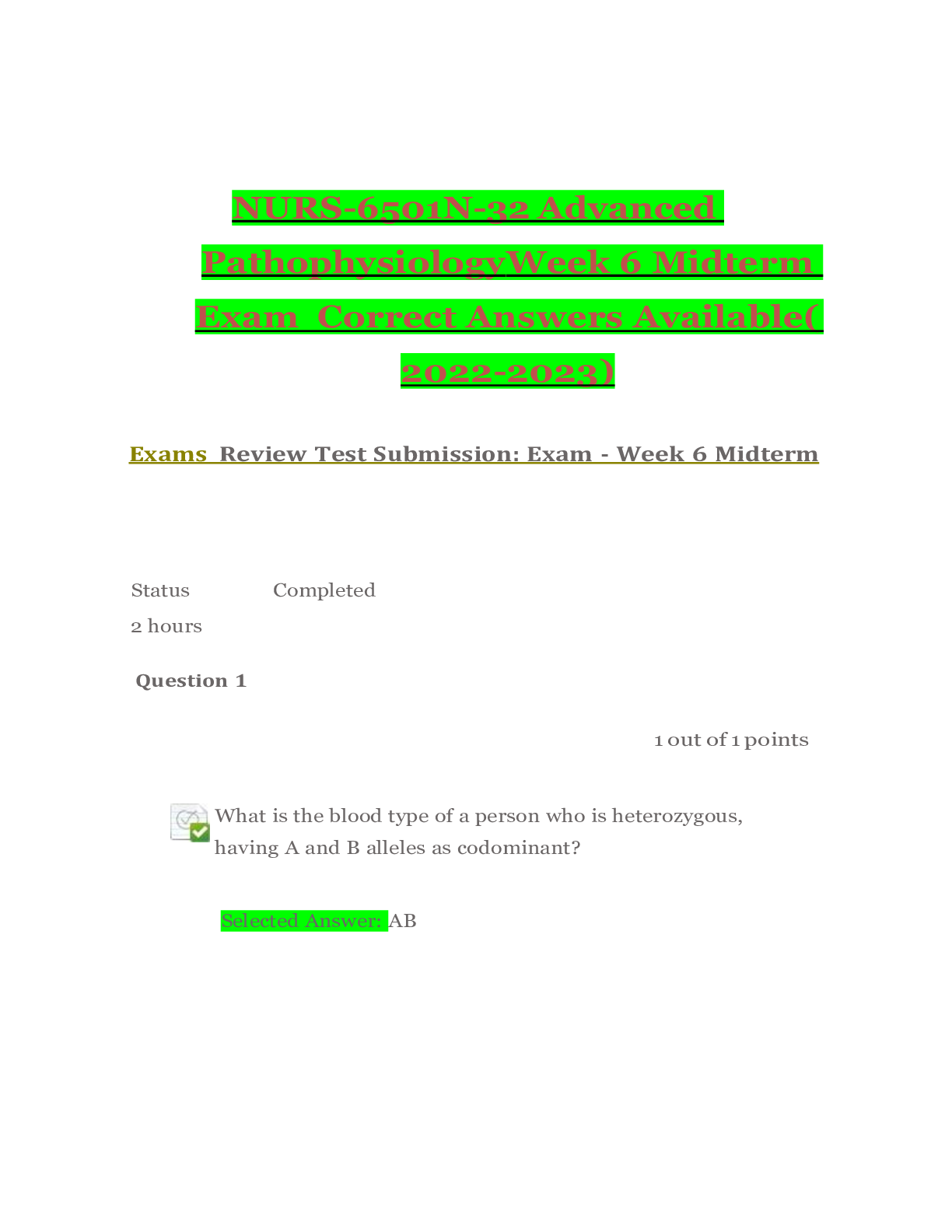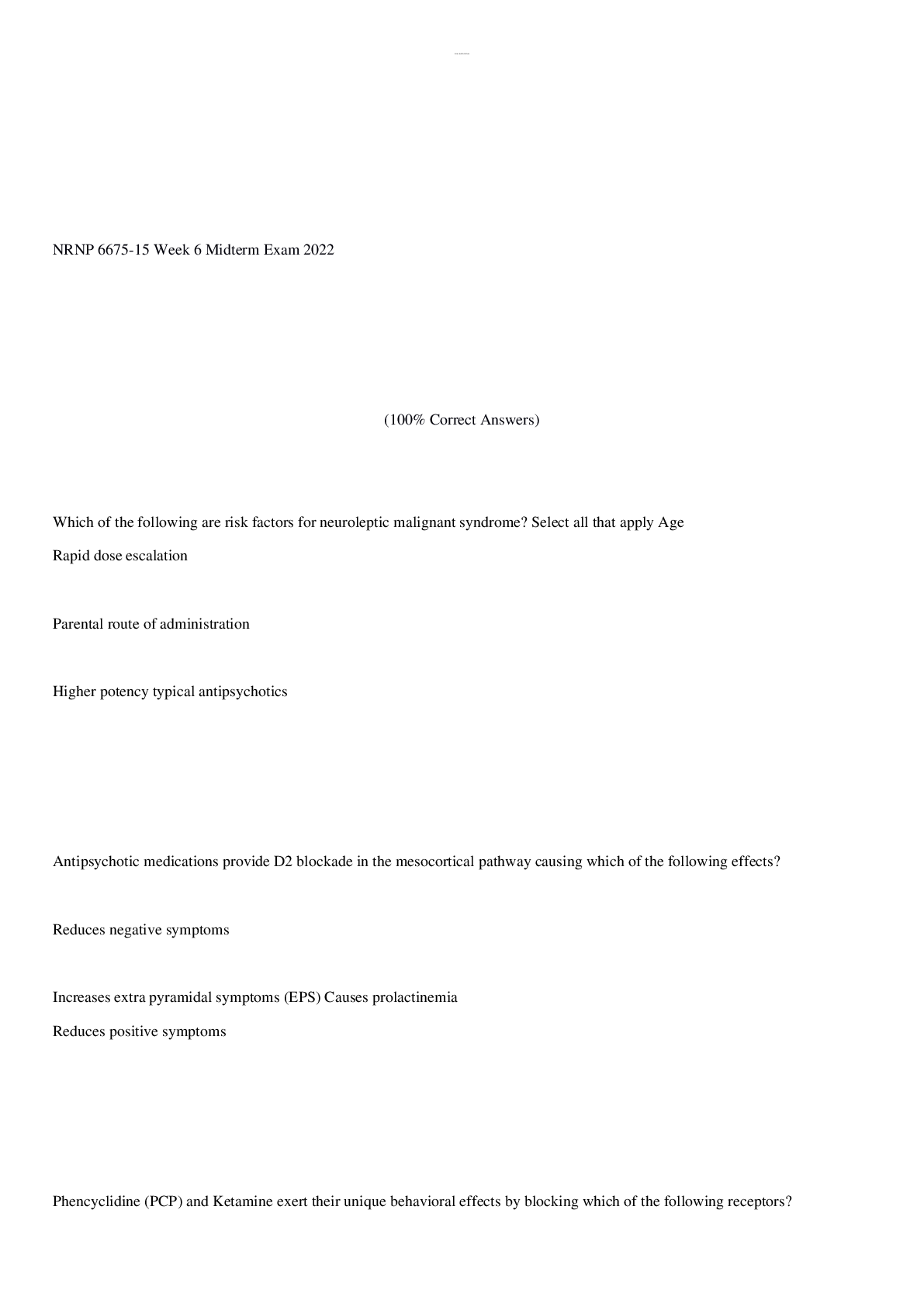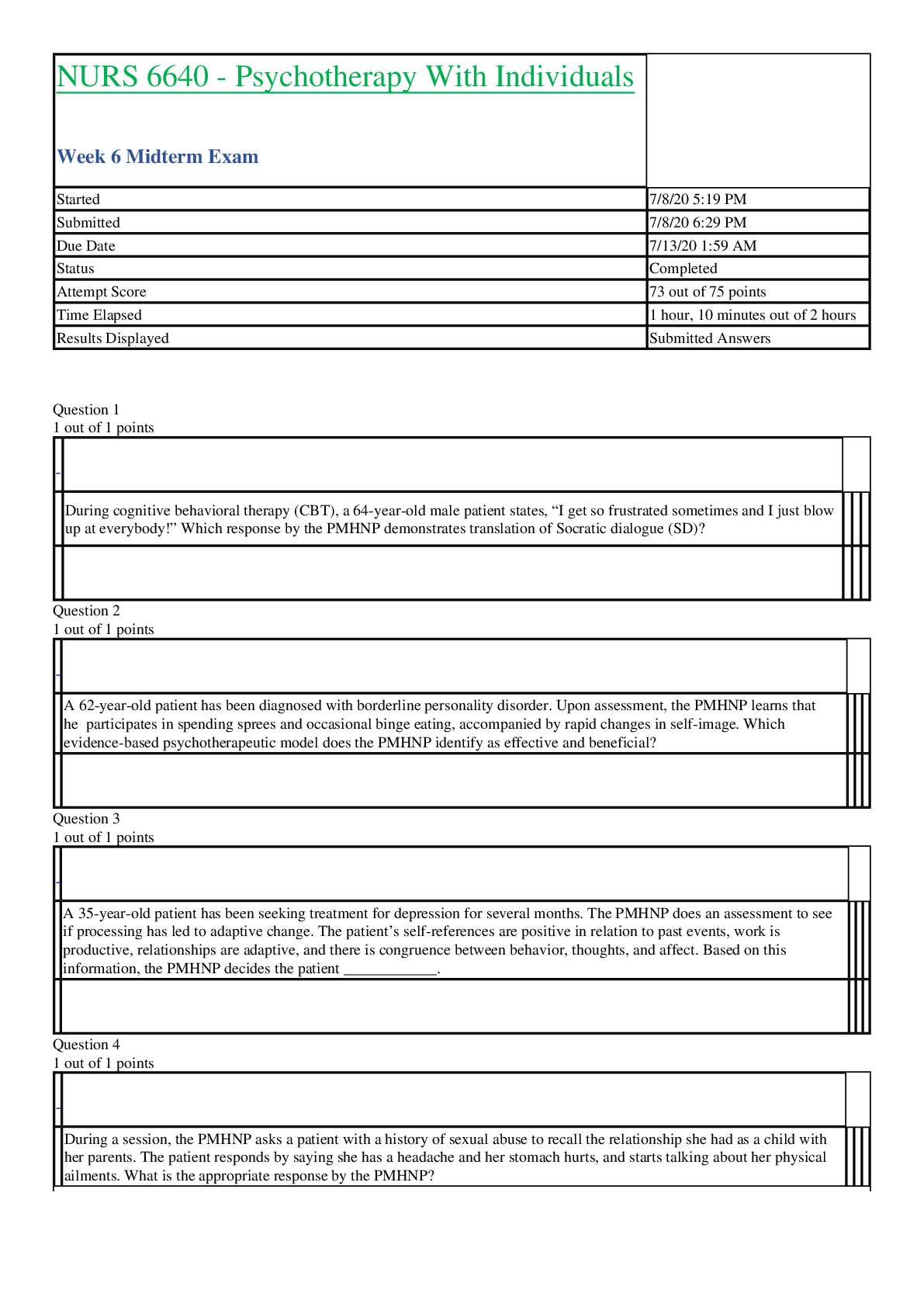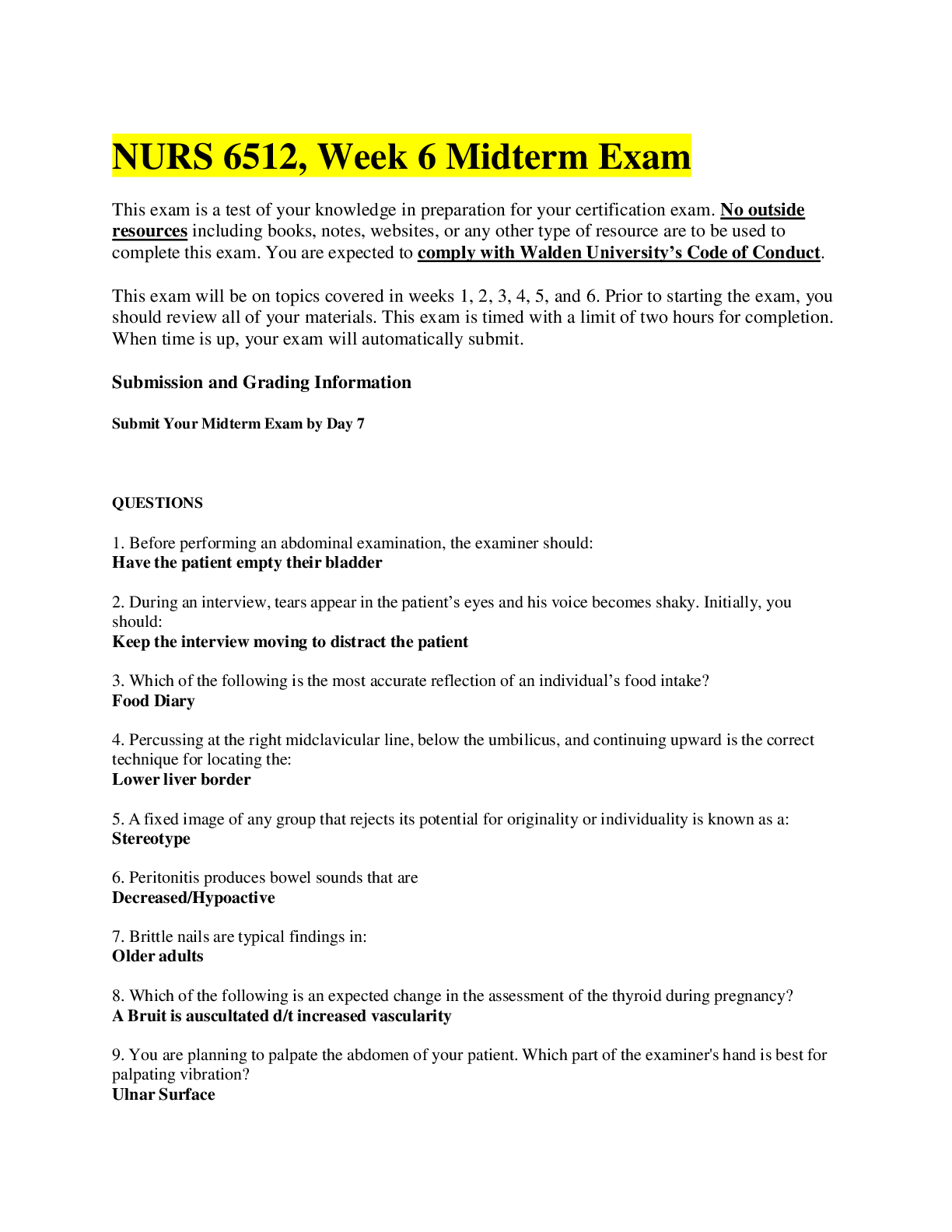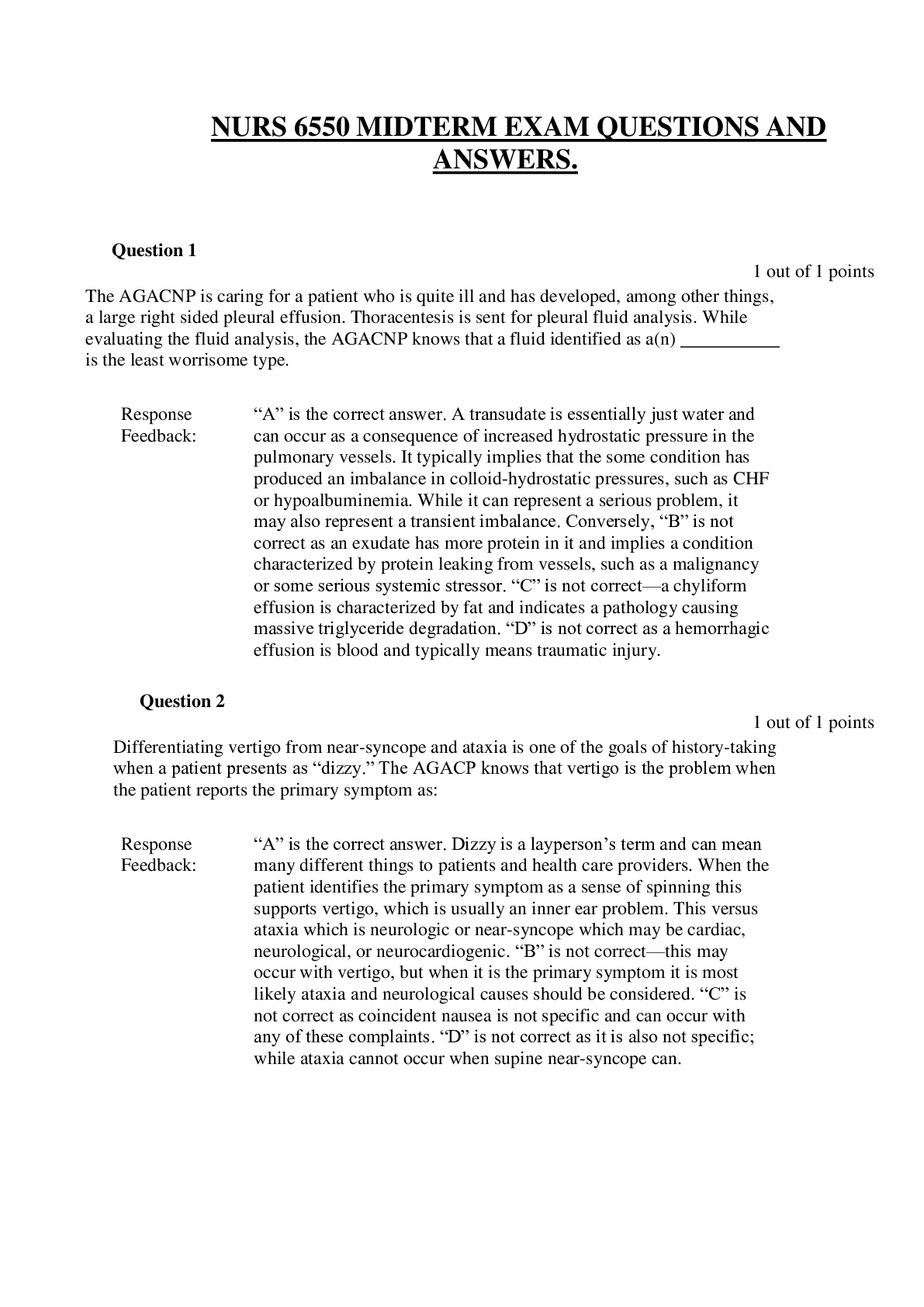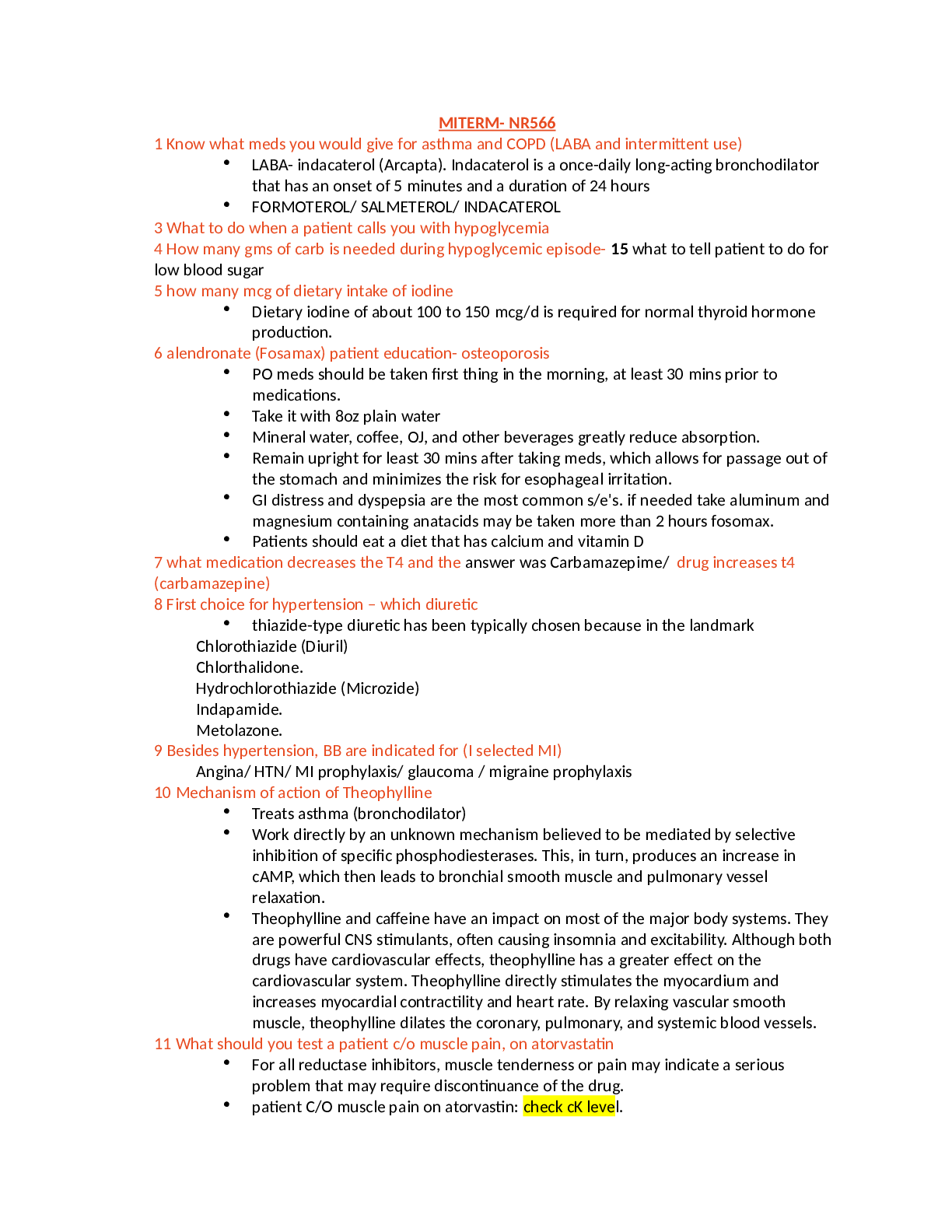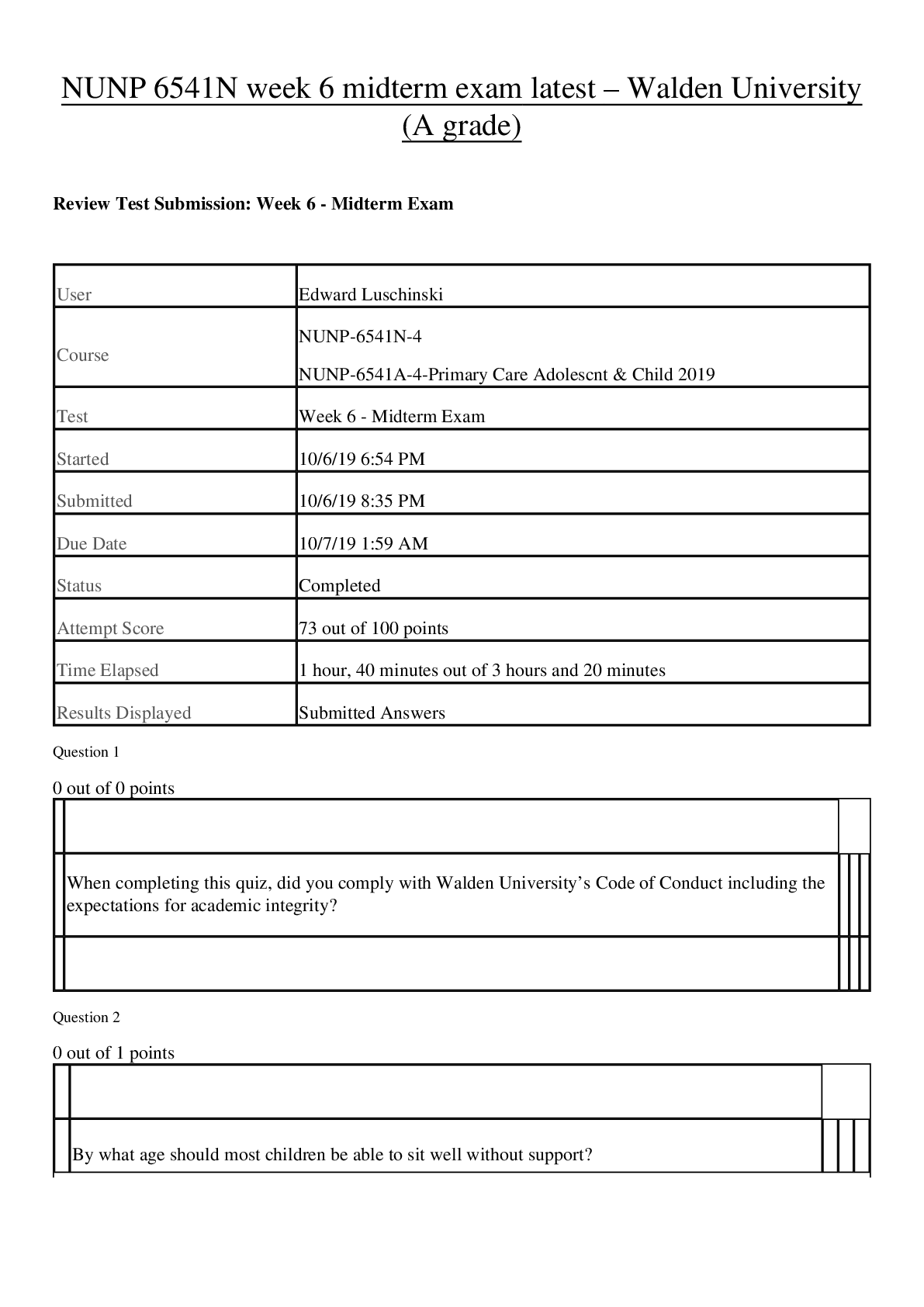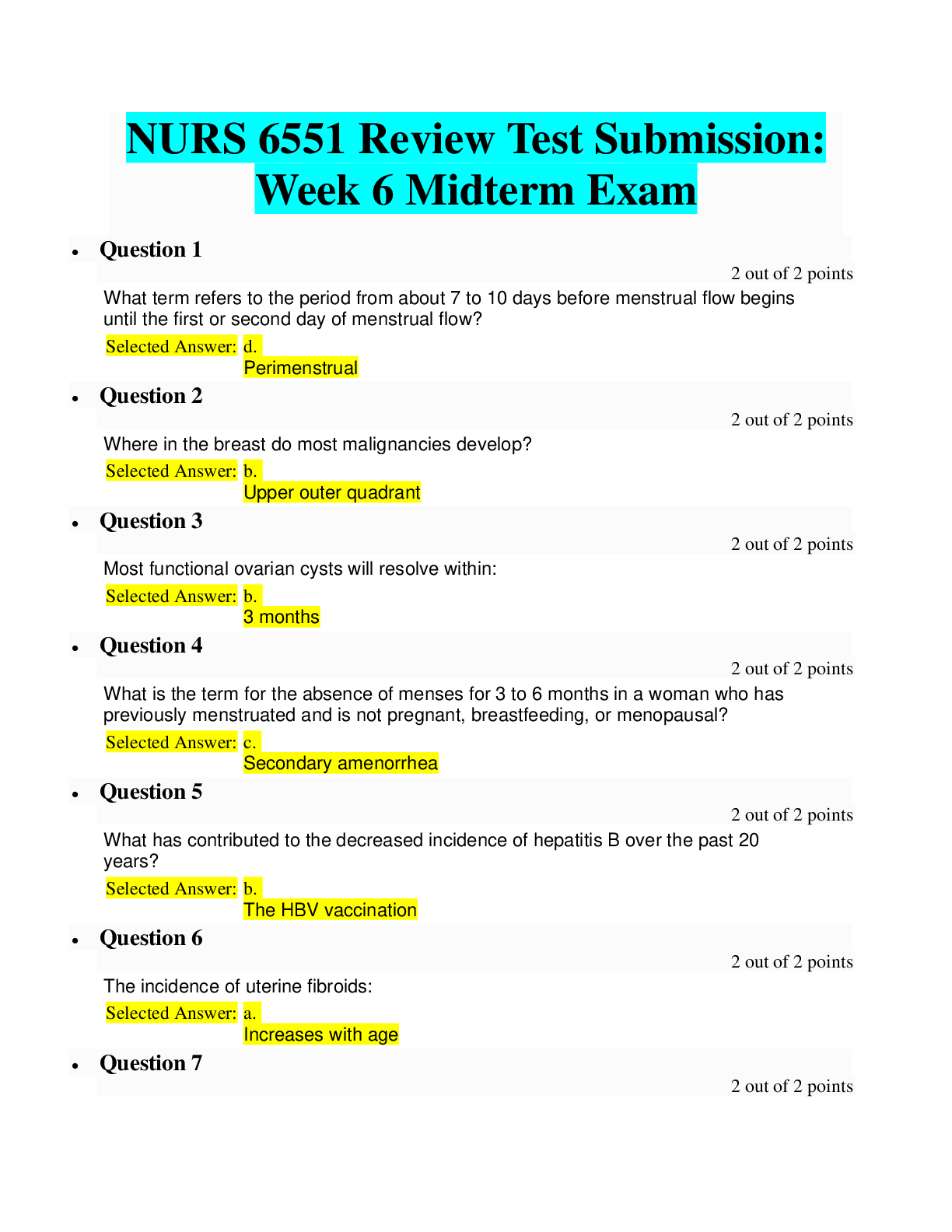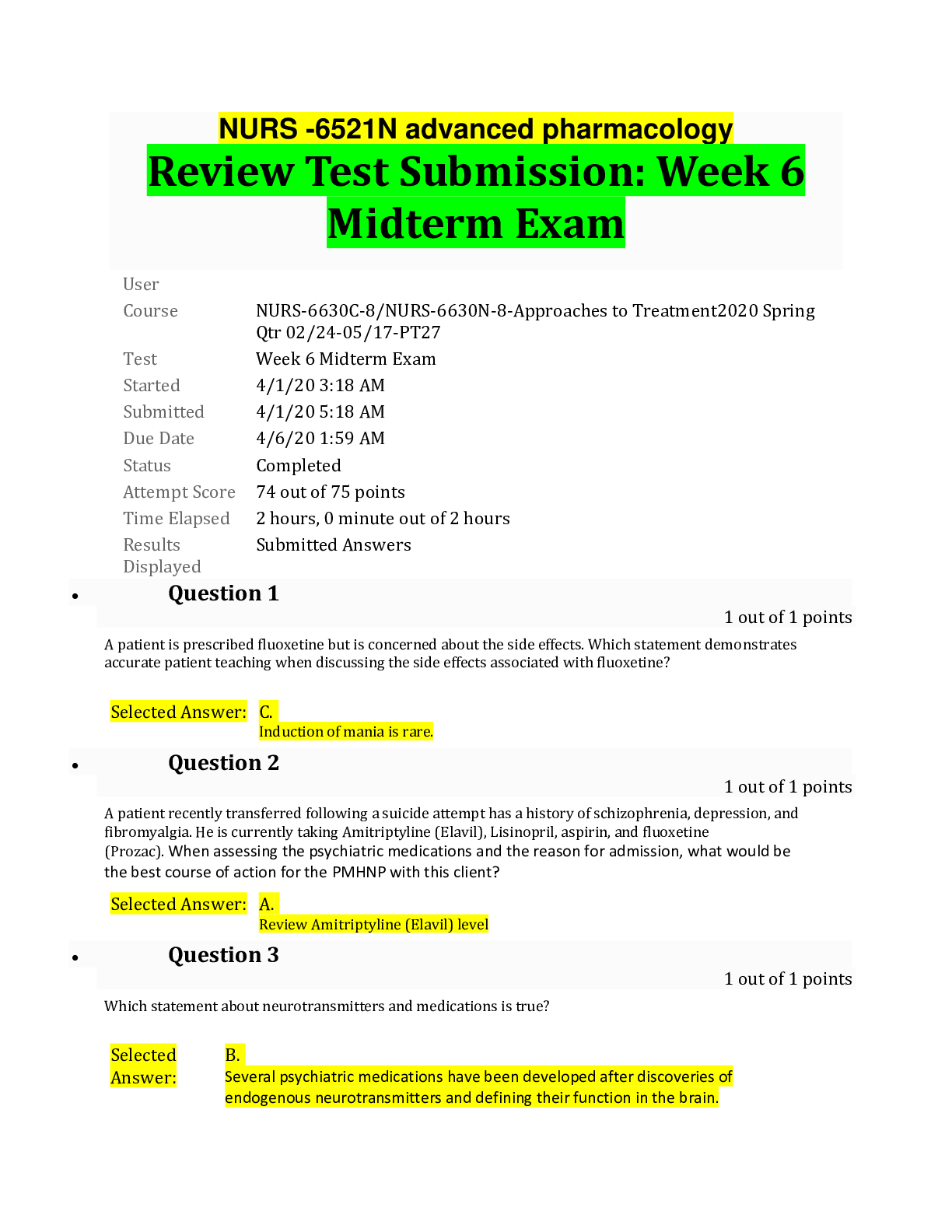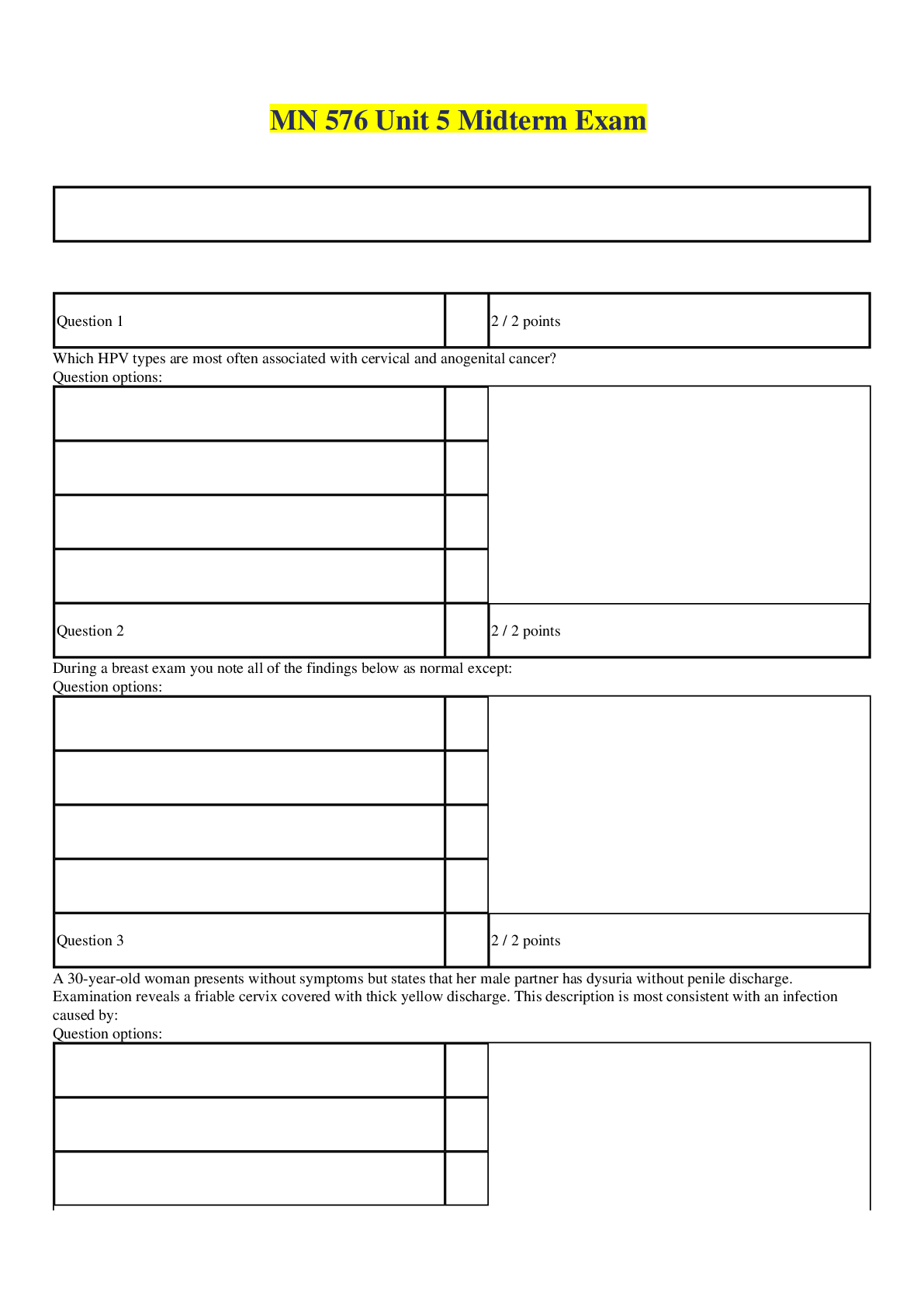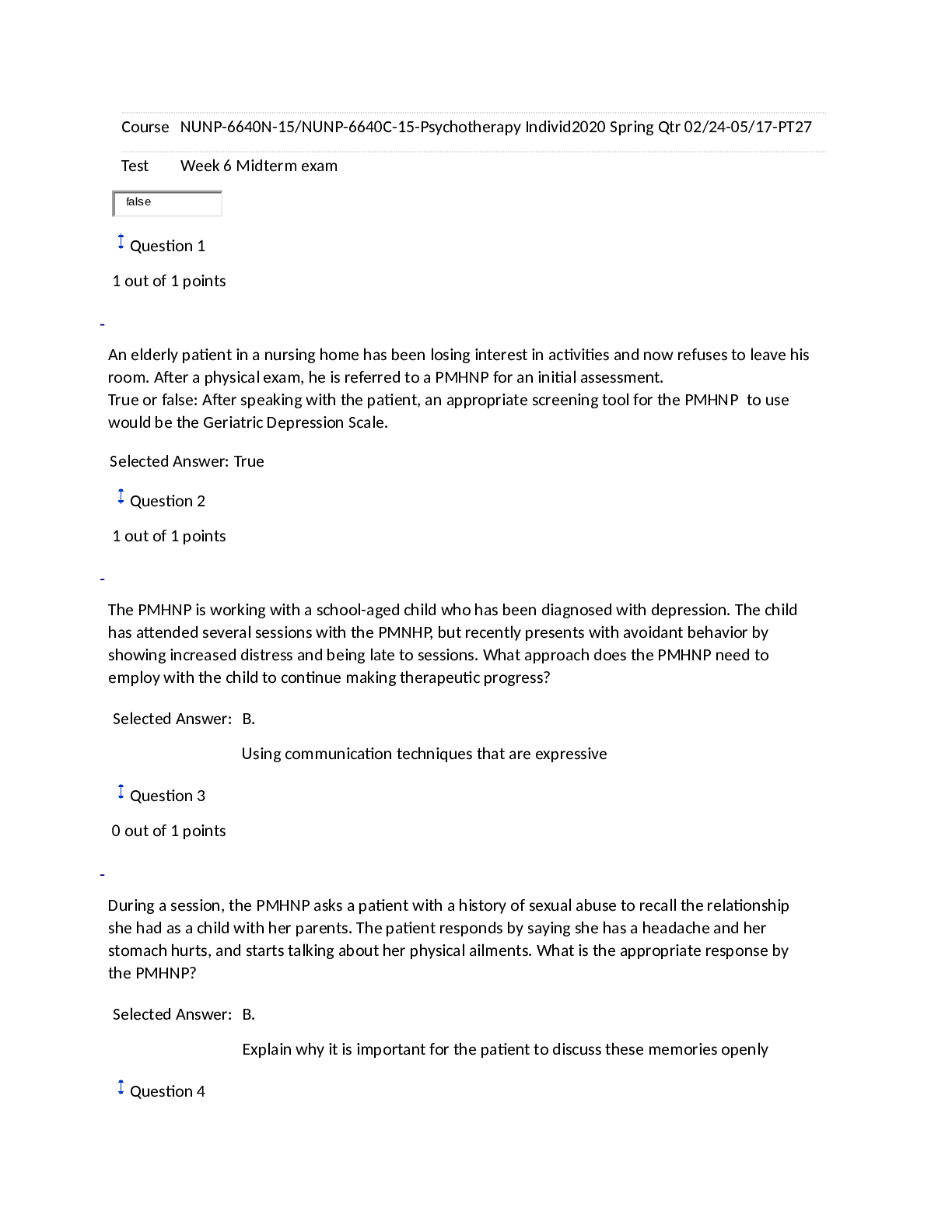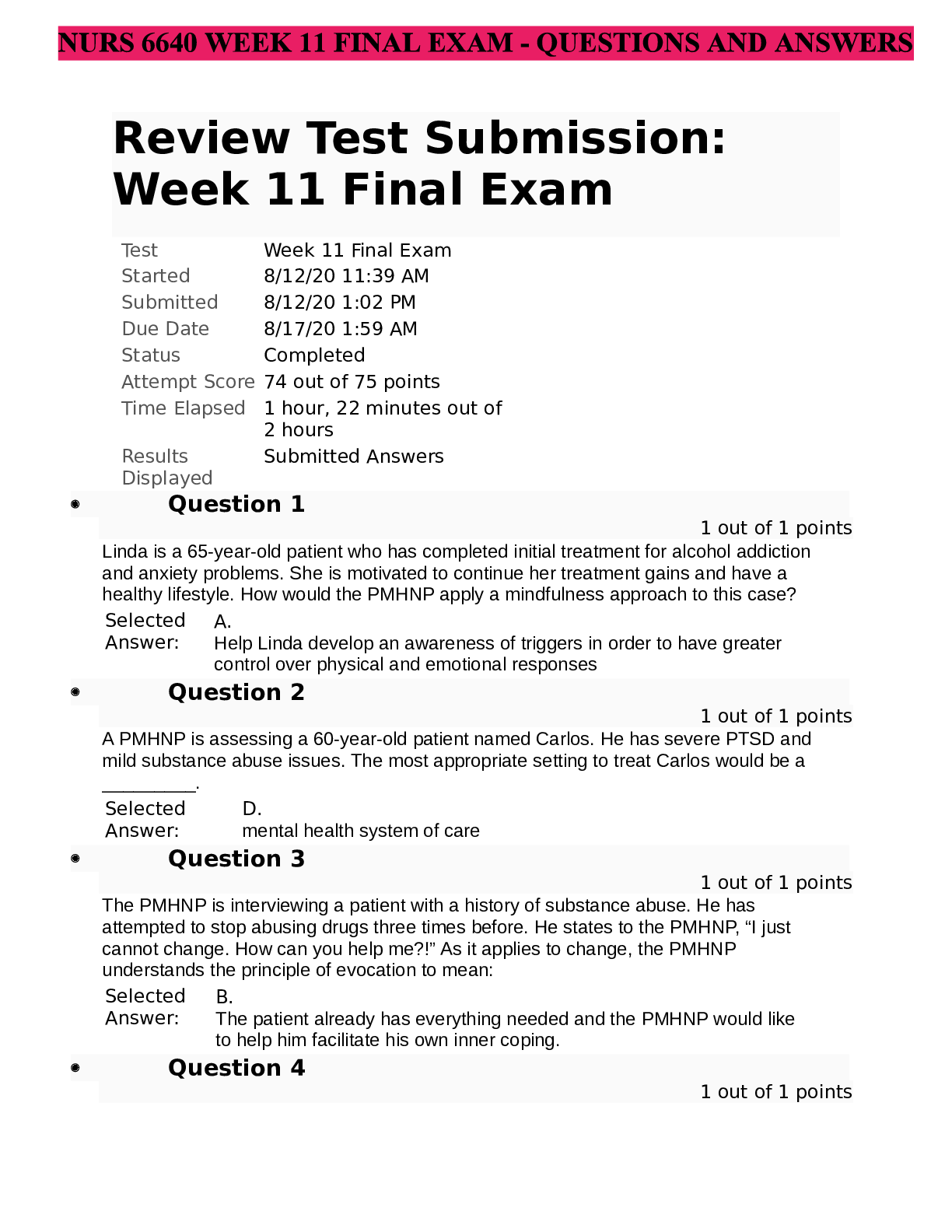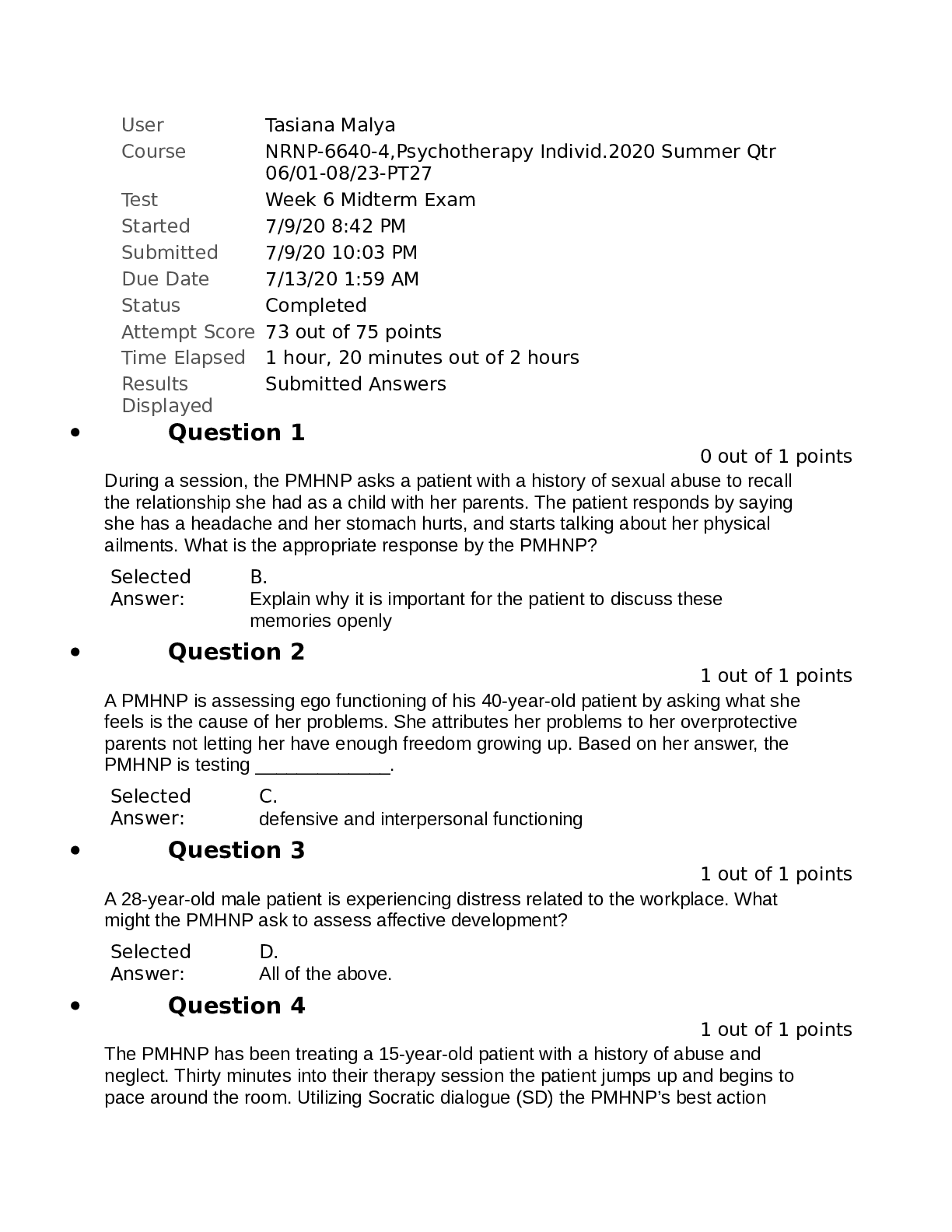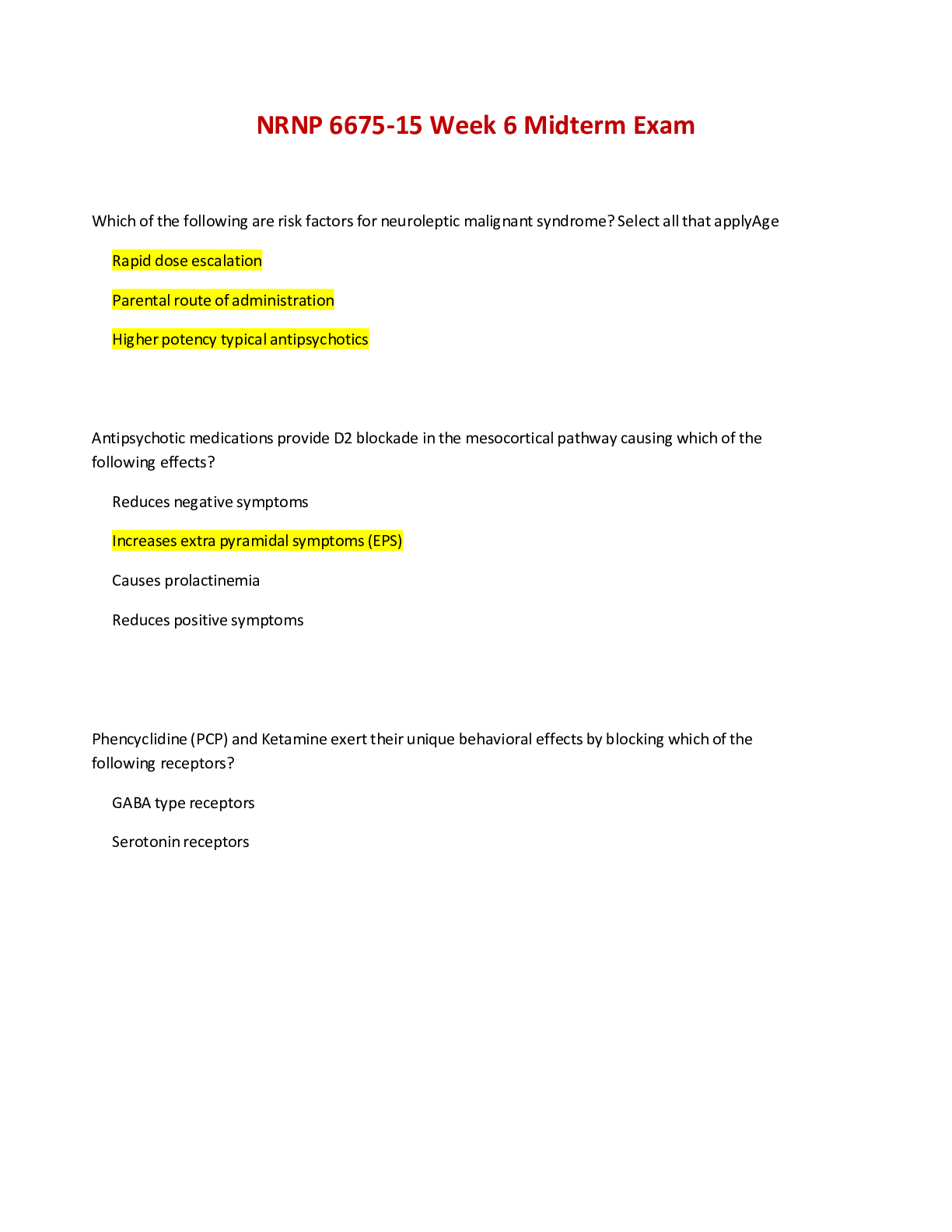*NURSING > EXAM > Walden University NURS 6640 Week 6 Midterm Exam - Questions with Verified Answers (All)
Walden University NURS 6640 Week 6 Midterm Exam - Questions with Verified Answers
Document Content and Description Below
Question 1 0 out of 1 points A PMHNP is treating a 45-year-old female patient who is upset that her brother has not been calling since his divorce. When asked to describe her brother and what prom... pts him not to call as frequently, she says, “Everything is about him, not me. I think he’s jealous that I have a good marriage and he wants me to be unhappy, too. So he doesn’t call to upset me and ruin my relationships.” Based on this information, the PMHNP can conclude that the patient _________. Selected Answer: B. has an insistent emphasis on the feelings of others Question 2 1 out of 1 points When a PMHNP is seeing a patient for the first time, what is an important step to assure that the patient and provider understand the limits of their discussion? Selected Answer: C. Have a discussion about the confidentiality and its limits Question 3 1 out of 1 points You are seeing a 29-year-old widow whose husband recently died overseas while serving his country in the military. She has been mourning the loss of her husband for several months, and continues to grieve. She refuses to go to group grieving sessions, but reports that she is still able to go to work and her fitness classes sometimes, and even makes attempts to stay social. She says, “Sometimes it’s like he’s not even gone. Other times it feels like it’s been an eternity since I’ve seen him. It’s hard to talk about this type of stuff with my girlfriends, especially since all of their husbands are still alive.” The PMHNP understands that it is appropriate to employ which therapeutic principle? Selected Answer: A. Encouraging catharsis Question 4 1 out of 1 points The PMHNP is treating a 35-year-old male officer in the military. He discloses that both of his parents are deceased and that he loved them. However, he says that he had feelings of inadequacy because his parents held him to a standard that he could never achieve. He went on to say that nothing he did ever felt good enough. The PMHNP assesses that this patient has perfect creases in his uniform with no strings or tags out of place; she also notices that he has perfect posture and questions him about ritualistic behaviors. She suspects that this patient has maladaptive responses to the expectations placed on him as a teenager and young adult. Which statements made by the patient would verify the PMHNP’s suspicion? Selected Answer: D. “I believe in systems; I have to have order and rules in my everyday life. If a task must be completed, I will often complete it myself versus depending on someone else.” Question 5 0 out of 1 points The PMHNP is working with a patient who experiences anxiety around her parents that later leads to poor impulse control. What will the PMHNP do to employ psychodynamic psychotherapy properly for this patient? Selected Answer: B. Focus on expressions of emotion Question 6 1 out of 1 points The PMHNP has been treating a 15-year-old patient with a history of abuse and neglect. Thirty minutes into their therapy session the patient jumps up and begins to pace around the room. Utilizing Socratic dialogue (SD) the PMHNP’s best action would be to: Selected Answer: C. Say, “I noticed a change. Can you tell me what happened?” Question 7 1 out of 1 points During cognitive behavioral therapy (CBT), a 64-year-old male patient states, “I get so frustrated sometimes and I just blow up at everybody!” Which response by the PMHNP demonstrates translation of Socratic dialogue (SD)? Selected Answer: B. “When you say blow up, what exactly does blow up mean and how does it feel to you?” Question 8 1 out of 1 points The PMHNP understands that anxiety and depression are two disorders in which their symptoms may overlap. When discussing this, you explain that the autonomic nervous system is activated and further helps distinguish anxiety symptoms by making the following points: Selected Answer: B. “You may experience fear, sweating, and muscle tension.” Question 9 1 out of 1 points The PMHNP meets with an adolescent patient who has depression and often presents with resistance when discussing his parent’s divorce. For the past couple of sessions, the patient has been quiet, sometimes refusing to speak. To further support the therapeutic relationship, the PMNHP: Selected Answer: A. Observes and points out the behavior Question 10 1 out of 1 points The PMHNP is working with a patient who experiences abreactions when discussing repressed feelings of his sexual abuse as a child. What can the PMHNP do to manage the patient’s intense emotional reactions? Selected Answer: C. Suggest a relaxation technique, such as yoga or meditation Question 11 0 out of 1 points A 35-year-old patient seeks treatment for depression and anxiety after an abusive relationship. To help empower the patient, the PMHNP wants to teach the safe-place exercise to create a feeling of calm. In order to walk the patient through the exercise, the PMHNP first says: Selected Answer: D. “Picture a beautiful beach and describe to me what you see.” Question 12 1 out of 1 points True or false: A PMHNP may ask his patient to describe her relationship with her father, both as a child and now, in order to assess interpersonal style. Selected Answer: Fals e Question 13 1 out of 1 points An initial evaluation reveals that an 11-year-old patient has moved to a new school after her parents’ recent divorce, and is having trouble making friends. The patient has normal mental status and exhibits appropriate behavior. What is the most appropriate scale for the PMHNP to use to get more information? Selected Answer: D. Impact of Event Scale Question 14 1 out of 1 points A 62-year-old patient has been diagnosed with borderline personality disorder. Upon assessment, the PMHNP learns that he participates in spending sprees and occasional binge eating, accompanied by rapid changes in self-image. Which evidence-based psychotherapeutic model does the PMHNP identify as effective and beneficial? Selected Answer: C. Dialectical behavior therapy Question 15 0 out of 1 points The PMHNP is working with an adult patient who has somatic complaints caused by a history of childhood abuse. As part of the therapeutic process, what does the PMHNP do to assess and organize a trauma history? Selected Answer: D. Debrief with the patient Question 16 1 out of 1 points The PMHNP is working with a veteran who has posttraumatic stress disorder (PTSD). The PMHNP believes that dual awareness will be beneficial in allowing the patient to focus on the here and now. What strategies can the PMHNP use to develop dual awareness in the patient? Selected Answer: D. All of the above Question 17 1 out of 1 points A PMHNP is treating a 50-year-old patient who suffers from depression. When he was growing up, he was often responsible for taking care of his three younger siblings. Since then, the patient puts other people’s needs before his own. Based on this information, the PMHNP would conclude that his interpersonal style is __________. Selected Answer: A. overly nurturing Question 18 1 out of 1 points The PMHNP is working with a patient who is living in poverty and abusing substances. According to the treatment hierarchy framework, what needs does the PMHNP need to attend to first? Selected Answer: A. Provide safety through case management strategies Question 19 0 out of 1 points During a session, the PMHNP asks a patient with a history of sexual abuse to recall the relationship she had as a child with her parents. The patient responds by saying she has a headache and her stomach hurts, and starts talking about her physical ailments. What is the appropriate response by the PMHNP? Selected Answer: C. Tell the patient that she may not get better if she does not face her fears Question 20 1 out of 1 points The PMHNP is mentoring a student. After working with a patient during a session, the student laments about all the things she should have, or could have, said to the patient. “I feel guilty that I didn’t speak up more about the patient’s concern toward her son,” says the student. The PMHNP understands that the student is exhibiting signs of which therapeutic concept? Selected Answer: A. Countertransfer ence Question 21 1 out of 1 points The PMHNP is working with a patient who witnessed her father pass away after suffering for several months from terminal cancer. The PMHNP sees this as a traumatic event. The patient reports sometimes feeling out of touch with surroundings; almost as if things feel like a dream. “Sometimes that sensation lingers for a while,” the patient says, “and other times I snap out of it quickly.” What does the PMHNP infer about the condition based on psychotherapy concepts for trauma? Selected Answer: B. The patient is reporting signs of dissociation. Question 22 1 out of 1 points A 65-year-old patient has suffered the loss of his wife. He is in a state of hyperarousal with increased sympathetic nervous system arousal. One or more interventions may help the patient to deal with this arousal. To decrease sympathetic nervous system arousal, the PMHNP’s treatment strategy is ___________. Selected Answer: D. all of the above Question 23 1 out of 1 points The PMHNP has been assisting a shy and timid 23-year-old male patient struggling with esteem and self-concept issues. Over the weekend, this patient was given the task of completing an exercise that would usually cause him distress and shame, also called a shame-attacking exercise. The PMHNP determines that this task has successfully been achieved when the patient states: Selected Answer: A. “I was able to eat in public yesterday despite how loudly I chew.” Question 24 1 out of 1 points A 16-year-old female patient has had a stable therapeutic relationship with the PMHNP for several months. The PMHNP notices what appears to be fresh cigarette burns on the patient’s arm. When asked, the patient admits to this self-injurious behavior. Although the patient is still depressed, her mood seems to be somewhat better this week. True or false: The PMHNP would most likely consider this patient stabilized and ready to move to Stage II. Selected Answer: Fals e Question 25 1 out of 1 points The PMHNP is meeting with a 42-year-old man with depression brought on by the recent passing of his wife. As he describes the circumstances surrounding his late wife’s death, the PMHNP begins to feel sad. The sadness lingers for several hours, and the PMHNP finds it difficult to focus on other patients for the rest of the day. What is the most appropriate explanation for the reaction that the PMHNP is experiencing? Selected Answer: C. Concordant identification Question 26 1 out of 1 points A PMHNP is preparing confidentiality forms for his patients. What is the most appropriate first step he should take? Selected Answer: B. Research his profession’s ethics code and state/federal laws Question 27 1 out of 1 points The PMHNP employs psychodynamic psychotherapy with a patient who experiences anxiety and depression. As the process enters the psychoanalytic end of the psychodynamic continuum, the PMNHP will focus on: Selected Answer: A. Interpreting unconscious conflict in the patient Question 28 1 out of 1 points During a therapy session the patient is asked how she currently deals with stress, and she says, “Well, I don’t. I just let it build and build.” The PMHNP responds by asking how well this has been working out for her. The patient states, “Well, to be honest, it just feels like I’m drowning, you know what I mean.” Illustrating idiosyncratic meaning, the PMHNP responds with: Selected Answer: B. “No, I am not sure what you are saying. Can you please explain?” Question 29 1 out of 1 points A 35-year-old patient has been seeking treatment for depression for several months. The PMHNP does an assessment to see if processing has led to adaptive change. The patient’s self-references are positive in relation to past events, work is productive, relationships are adaptive, and there is congruence between behavior, thoughts, and affect. Based on this information, the PMHNP decides the patient ____________. Selected Answer: C. is ready to move to Stage III, future visioning Question 30 1 out of 1 points During cognitive behavioral therapy (CBT), a 64-year-old male patient, states, “My wife hates me! She’s just waiting for me to die.” Using Socratic dialogue (SD) the PMHNP demonstrates understanding of analysis when she responds: Selected Answer: D. “What has [Show More]
Last updated: 1 year ago
Preview 1 out of 17 pages

Reviews( 0 )
Document information
Connected school, study & course
About the document
Uploaded On
Jul 01, 2022
Number of pages
17
Written in
Additional information
This document has been written for:
Uploaded
Jul 01, 2022
Downloads
0
Views
77

